#Honma Eiji
Explore tagged Tumblr posts
Photo

So, to celebrate the new year I’ve decided to make a series of Joker Game De-motivational posters using the Joker Game characters and quotes from the show (or quotes based on the ones used in the show).
While this is mean to be fun since this is a set of de-motivational posters and Joker Game has also characters who do not give nice quotes (Harakiri anyone? Oikawa and Muto anyone?), well, think carefully before you decide to proceed.


















But remember...

EXTRA


Okay, okay, it’s only a retrasmission so it should be...

...but we can always hope, can’t we?

No, hum... the truth is...

HAPPY NEW YEAR!
Also it'll be nice if you were to let me know which ones worked better so I can improve and make better next year!
#Joker Game#Sakuma#Miyoshi#Kaminaga#Odagiri#Hatano#Fukumoto#Jitsui#Amari#Tazaki#Oikawa Masayuki#Honma Eiji#Aaron Price#Arisaki Akira#Yuuki#Gamo Jiro#Kazato Akimasa#Muto#Akutsu Yasumasa#Joker Game Edit
33 notes
·
View notes
Text

Congratulations!!!!! Cherry magic✨🍒✨


this little cute is actually tall

CUTE


#cherry magic#congratulations#akaso eiji#honma kanami producer#waiting for season 2#My best tv award#Galaxy Awards
75 notes
·
View notes
Photo










Here's a V2 of an alternate history of one of my favorite movies, Godzilla (1954), based on Eiji Tsuburaya's little known original idea for the film. This is the most large-scale project I've yet made with Midjourney and really tests its capabilities. I fed it images from a variety of Japanese monster films and behind the scenes pictures and did some work in Photoshop. I also added grunge, grain and blur to some images to give them a more authentically vintage feel. Much of this is based on genuine people and Japanese film history.A Giant Ghost Whale Appears in Tokyo (1953), aka Kuzila, the Monster Whale God, was Japan’s first major giant monster movie. Made by major studio Kantoho and director Inushiro Honma, it featured monster sequences helmed by tokusatsu (Japanese-style special effects) director and luminary Eichi Marutani. Marutani was only recently allowed to return to Kantoho after being expelled from public office by the U.S. Occupation for his involvement in propaganda productions. The story featured a giant monster whale, mutated by hydrogen bomb tests, who attacks and destroys the city of Tokyo as retribution for Japan’s whaling trade which Marutani felt a lot of personal guilt over. Marutani honed revolutionary FX filmmaking technology never before used in Japan on A Giant Ghost Whale Appears in Tokyo. To create its monster Kuzila, the crew used a variety of puppets, mostly pulled along on wires, and a stuntman in a monster suit to portray the creature whom they then had unceremoniously destroy a model city of Tokyo.
2 notes
·
View notes
Text
How the diverse world of the addictive tv series “Cherry magic” got made
(interview with scriptwriter Yoshida Erika by Yokogawa Yoshiaki)
沼堕ち続出ドラマ“チェリまほ”の多様な世界はどうやって作られたのか【脚本家・吉田 恵里香さん】2020.12.22 横川 良明
for @howdydowdy because we were talking about what a fantastic character Fujisaki is and the notion of consent when it comes to reading someone’s mind
Currently, societal values continue to change rapidly. On one hand the movement of respecting each other’s diverse individualities and making it easier for each and every one to live in society has become more active, one the other hand it is not a rare occasion to be lost for words when suddenly unconscious discriminatory biases – derived from not being able to cut loose old values that are rooted deep in oneself – raise their heads.
How should we exist within this period of polarization? This series is to create the opportunity to think about this topic by having discussions with the toprunners in the entertainment world. The person I am introducing for the first edition is screenwriter Yoshida Erika.
She is behind the script of “Thirty Years of Virginity Can Make You a Wizard?!”, the tv series that has grabbed the first spot on the oricon satisfaction ranking for 4 weeks in a row, and has gained fast popularity despite its late-night spot. The enthusiasm for the show can be attributed to the soft view Ms. Yoshida has on the world.
Yokogawa Yoshiaki (YY): I am happily watching the series. I really liked the original work, however the way it was adapted to a television format has been brilliant. One big thing is the making of the character of Kurosawa played by Machida Keita. By Adachi’s magic (played by Akasouji Eiji), the voice of Kurosawa’s heart spills out, and while the original text had him be quite blatant in his expressions overall, the drama carefully examines them.
Yoshida Erika (YE): That is definitely where there is a difference in depth. The original has the premise of a work in the BL genre, readers are expecting a BL-like development, so they can take such things in stride, but the viewership of the tv series is more varied. Under them there might be people who do not like BL. That is why I was conscious about how different people from different backgrounds might watch this show.
It is not okay to assault someone just because you were invited to their house, kissing or touching without consent is not okay and being of the same or different sex makes no difference in this. Treating such things as okay because it is BL would be rude to the parties concerned. Because we are using the BL genre, we want to specifically protect the “firsts” of the parties concerned. That is something the producer Ms. Honma Kanami and the director agreed about and I therefore paid extra attention to.
YY: Adachi himself, as he is about to step into Kurosawa’s house thinks “Not that I might possibly get assaulted?!”, and is very vigilant, but with some soul-searching realizes that that is rude towards Kurosawa. To say it briefly, you can feel the probity of the creators.
YE: I thought that a main character that thinks that he will get assaulted when he steps into the house of someone will not be loveable. No matter how well received the person is who acts it out, if we cannot love them on a human level, this drama will not work. Adachi’s power to read people’s hearts is also the action of seeing people’s darker sides on his own volition. That’s why a character we cannot love as a person will receive push-back by the viewers.
YY: Just like you said, the act of reading peoples’ hearts includes great violence. That is why I think that when he realizes that Kurosawa has fond feelings for him, unlike the original where he reads Kurosawa’s heart on purpose, the drama treats it as an accidental force. Over the whole series, it is of focal importance that Adachi doesn’t overuse his magic.
YE: That is where we were extremely careful. In the manga easy comprehensiveness is important and that type of suspense is interesting - and we don’t intend to deny that - but if you do it as a drama, I didn’t want to make him into a young man using his powers at ease. That is why, especially in the first half, he decides and tries very hard not to use his powers when possible. The scene where he reads the CEO’s heart appears in the first issue of the original, but in the drama we pushed it back to the 5th episode. We made it a point to illustrate how Adachi is filled with the emotion to help Kurosawa and that is why he uses his powers.
-
That what I don’t want others to do unto me, I do not want to inflict on characters.
-
YY: His colleague Fujisaki (Satou Ryo) is a Fujoshi in the original and that premise was cut from the series. If you decided to have a Fujoshi character on a prime time show, did you think that misunderstandings might arise easily?
YE: That was definitely a thought. In BL as a genre it is not an issue that a character exists that takes the same viewpoint as the reader, and I love Fujisaki in the original, but the people who are acting it out in reality are real people. At that point, loudly fawning about someone else’s’ love life is not perceived as good conduct. At the least, I thought that I wouldn’t want to be treated like that.
YY: It is fine to envision fictional characters as romantic partners, but it is different when you make a real acquaintance the target of that.
YE:
A thought we had was that if Adachi and Kurosawa were to really date it would be one thing, but grinning at someone - who might even be heterosexual – because you inflate your own BL adjacent delusion isn’t much different from a man grinning at a woman with big breasts and calling her sexy. I wouldn’t want to get treated that way, so I didn’t want to inflict that on the characters in the story as well.
When it comes to Fujisaki it isn’t like she isn’t a Fujoshi. We do not clearly state it, but I thought there was no reason to show it in the drama.
YY: You are saying, that it is fine that people might interpret Fujisaki as a Fujoshi when she is smiling at Adachi and Kurosawa.
YE: Yes. That is where you are free to imagine (laughs).
YY: What I thought was very fresh is that instead of proclaiming her to be a Fujoshi, Fujisaki is turned into someone who “is happily living her daily life even without romantic love”. We don’t often get characters like that in Japanese tv series.
Personally, I also like romantic tv series, but while feeling venerated when the main characters have realized their love in the final episode, when trying to build a romantic connection to someone else in real life it might not go well and beyond that, it is not that it never happens that I, who also holds interests in other things than romance, end up feeling empty because of the lonely feeling of having been left behind (when watching a romance on tv unfold).
But with having Fujisaki appear, it felt like I got rescued.
YE: Until now, for several projects I made the suggestion of a character that is not interested in romance, but I wasn’t understood. “Is it necessary to do that?” “Aren’t you overthinking it?” were things I got told often.
But with this production, when I said that I wanted Fujisaki to be asexual or aromantic, no one denied me. From that stage on I thought that this place was a good one, and thanks to the original writer giving her agreement it got turned into reality.
YY: Since this kind of character hasn’t really appeared in a tv series, it felt like people like Fujisaki were assigned to be non-existent in this world. But thanks to you envisioning her like this, seen from a person that like Fujisaki might say “I got used to acting “normal”” and feel a notion of despair when confronted with people not understanding them, it felt like it got emphasized that people like her also exist in our society. Picking such little voices feels like it is one of the purposes of entertainment.
YE: If that could become the case I would be glad about it. 10 to 20 years prior, a “fairytale gay” (describing the flamboyant gay friend, that mentally supports the heroine by giving some harsh but accurate advice) often appeared in tv series from abroad, but this portrayal slowly changed, finally it has reached the point where the view point that being gay isn’t something special has penetrated the public.
So this time, I believe that one of my duties was to tell the story of people that are not interested in romance or people who do not only love one person, not from a standpoint that is convenient for consumption, but to have properly realized characters up to their individual backgrounds.
-
I hope the time comes where it isn’t necessary to especially say “This is a BL series”
-
YY: Please let me speak on something that has confused me this far. Prior, when you explained Fujisaki in context of the script, it felt like it wasn’t okay to call her asexual or aromantic because she herself doesn’t use any of those labels. I was somewhat afraid that an outsider would just selfishly declare that “you are asexual, aren’t you!?” in regards to someone who hasn’t professed anything.
YE: There is the point of both of the terms asexual and aromantic not being widely known in Japan as much as compared to overseas and I also think there are people who just wouldn’t use these words. Even when you think you are not interested in romance at the moment, it could also be that you just haven’t found the person that makes you feel that way. That’s why I can understand how labelling someone has a violent notion.
YY: My next question is also relating to that: This applies to Cherry Maho, but generally when I write about over works that feature a lovestory between men I try not to use the word BL.
This is my own opinion but to me it feels like the term BL has too much of a sexual image.
In private I casually use the word BL. However, for the content of an article that is read by an unspecified number of people, I remember stumbling over labelling something as BL. Using BL as an easy genre specifier has the effect that there will be a layer that won’t get looked at. I simply want to have more people enjoy a piece of work. I don’t object to the editor using BL in the title but in the content I write, I try not to use the term BL story but simply “love story between two men” and keep it close to how you’d address it in reality.
YE: I understand that. Obviously, I don’t intend to shame the taste of people that like BL. However, I understand that there are people that feel a sense of resistance towards BL as a genre. That is why I also don’t use the word BL when I promote on twitter. I do think that it would be great to have a new word.
Just like women have things they don’t want to be subjected to, men also have things they don’t want to be subjected to. This kind of awareness has become more broadly spread bit by bit. However, in order to have it really penetrate society it needs for the voices of the affected people to be heard. But it is also the reality of today’s society that violence is directed at people that raise their voice. That is why I feel like it is the job of the people that create tv shows to speak up instead.
At the least, that is how I want to straightforwardly create the world, so that in 10 years without directly stating “this is a BL series” we have a society that takes it in as a “new cool romantic drama beginning” with “the leads being actor x and actor z” and as nothing unusual. Now we really have such a transitional period, and as a writer I want to build the steps towards it.
-
original article: https://mi-mollet.com/articles/-/27045?page=3&per_page=1
#cherry magic#thirty years of virginity can make you a wizard#30歳まで童貞だと��法使いになれるらしい#30 sai made#a bit rusty with my translations but i really enjoyed how they were talking about the writing and character composition in the series and#decided that I had to share#long post
112 notes
·
View notes
Photo
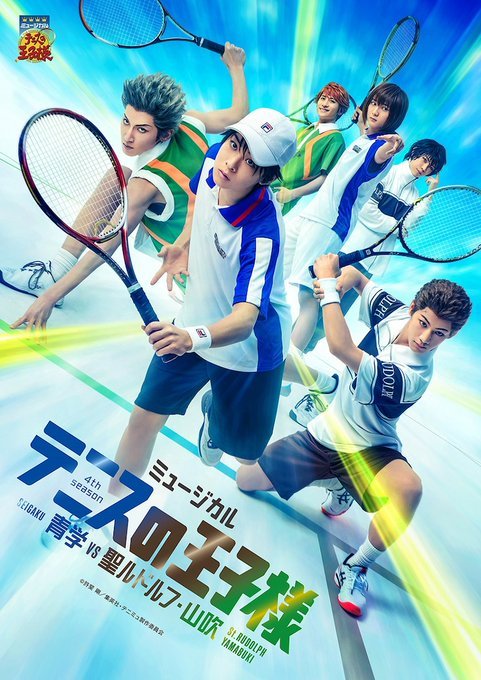
[Pics] ミュージカル『テニスの王子様』4thシーズン 青学vs聖ルドルフ・山吹 (musical tennis no oujisama 4th season seigaku vs sei rudolph gakuin・yamabuki)
main visual ↑↑↑ & visuals update under the cut^^
Cast:
SEIGAKU
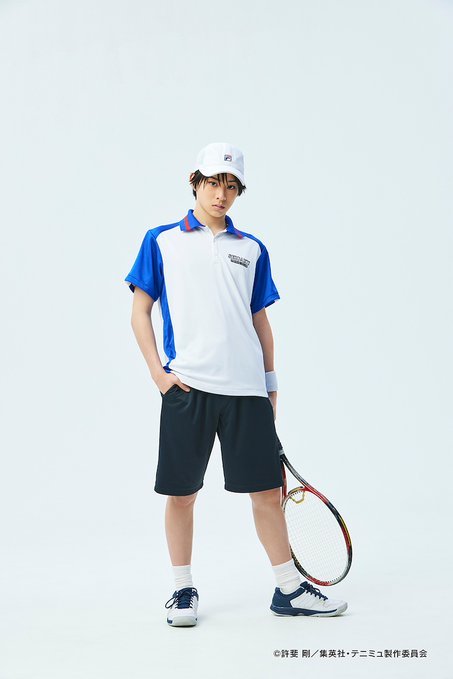
Imamaki Hikaru as Echizen Ryouma (越前リョーマ)
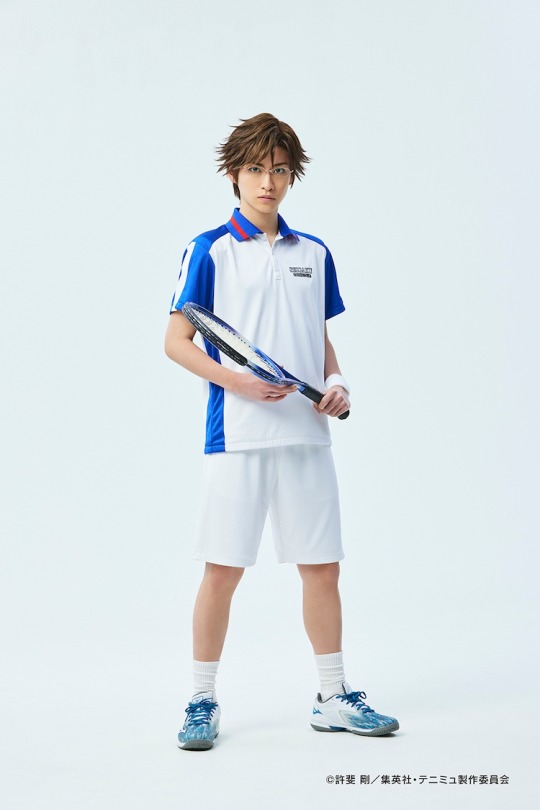
Yamada Kento as Tezuka Kunimitsu (手塚国光)

Hara Takakazu as Ooishi Shuuichirou (大石秀一郎)
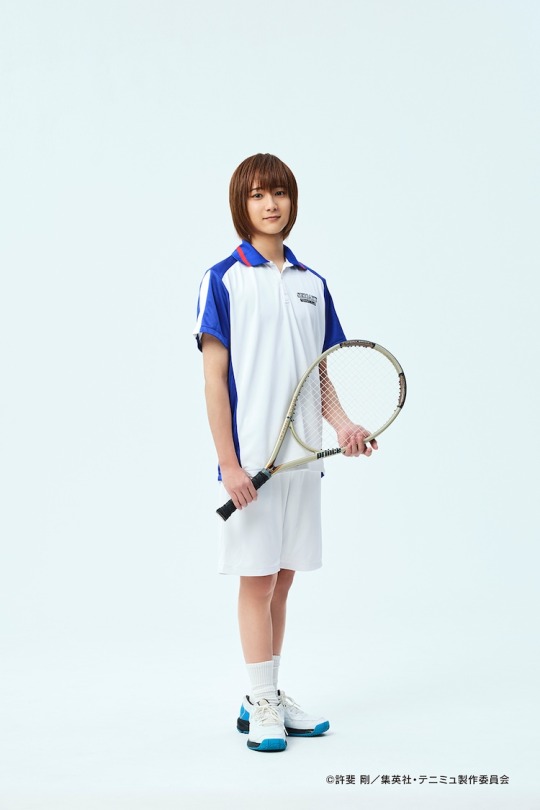
Mochida Haruki as Fuji Shuusuke (不二周助)

Shioda Ichigo as Inui Sadaharu (乾貞治)

Tomimoto Soushou as Kikumaru Eiji (菊丸英二)

Ootomo Kai as Kawamura Takashi (河村隆)
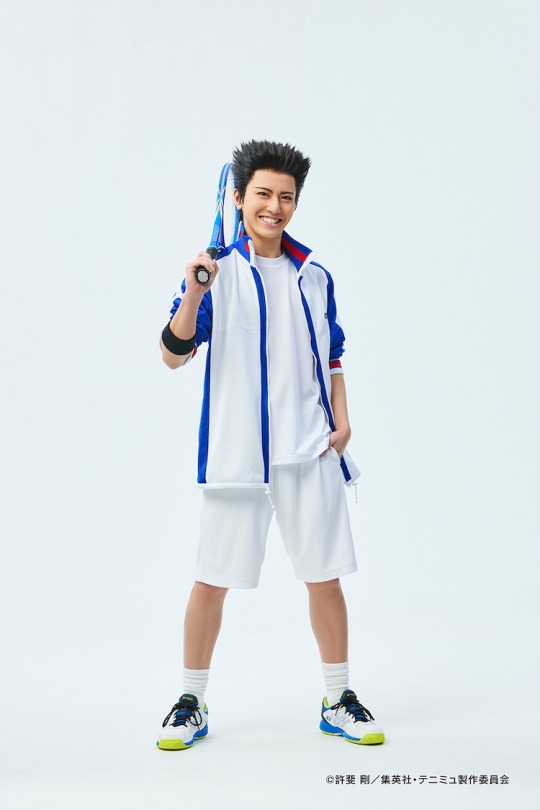
Houjuyama Shun as Momoshiro Takeshi (桃城武)

Iwasaki Yuuga as Kaidou Kaoru (海堂薫)
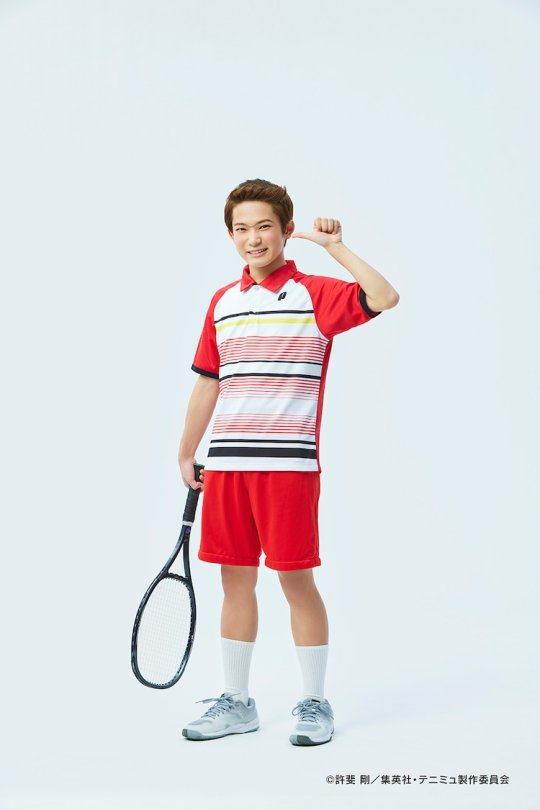
Ryouta as Horio Satoshi (堀尾聡史)
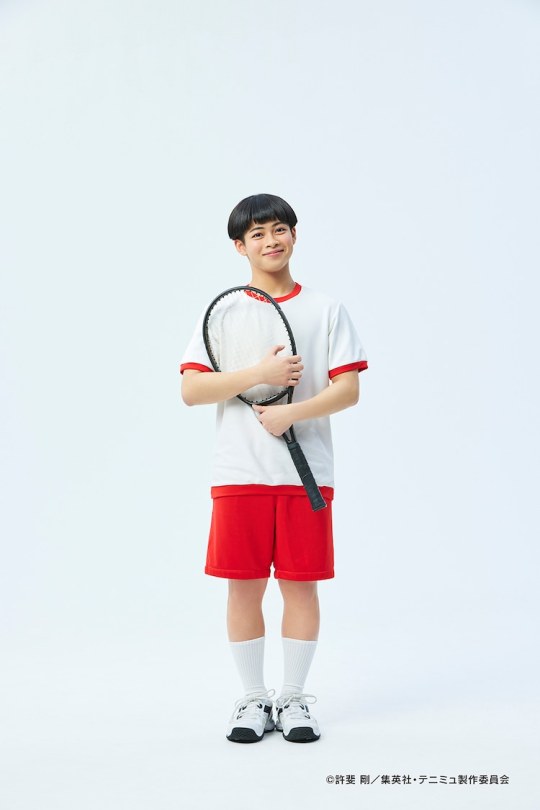
Shiraishi Kotobuki as Katou Kachirou (加藤勝郎)
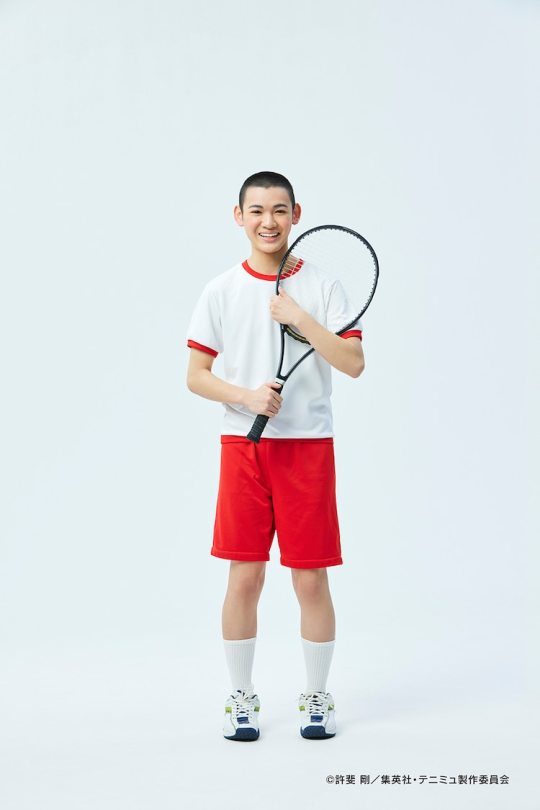
Ichikawa Manato as Mizuno Katsuo (水野カツオ)
ST. RUDOLPH
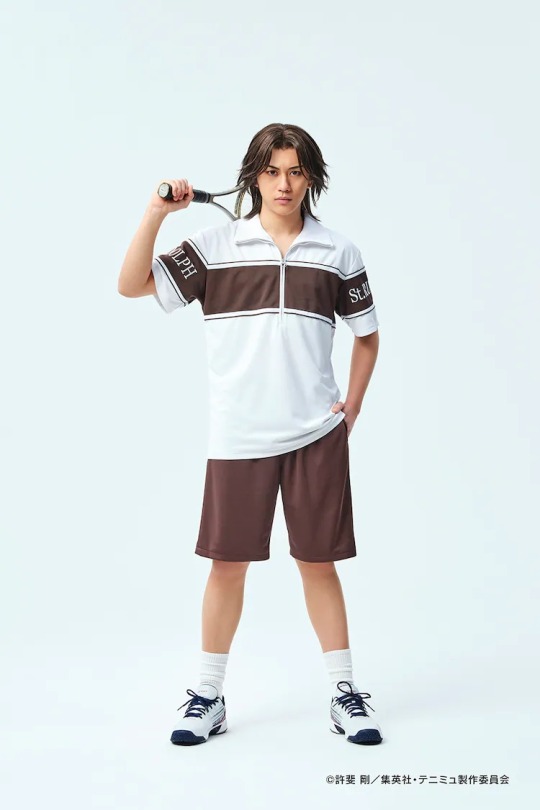
Okumura Hitoshi as Akazawa Yoshirou (赤澤吉朗)
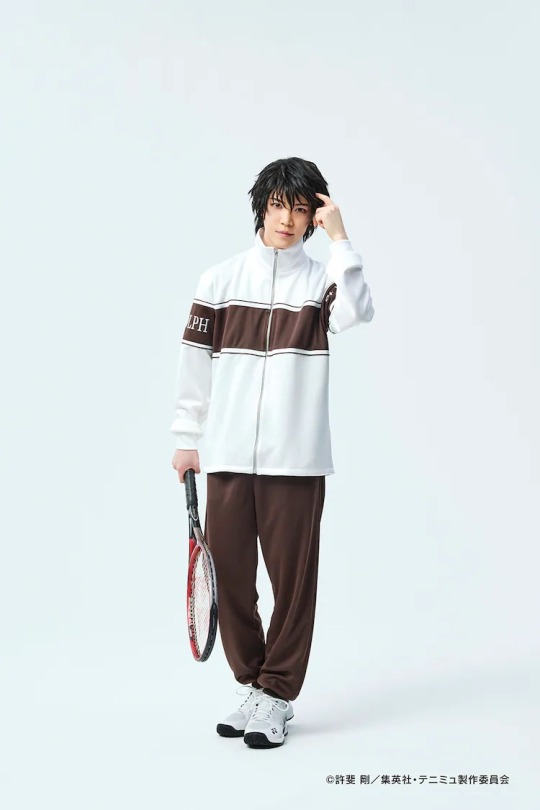
Mitsui Junpei as Mizuki Hajime (観月はじめ)
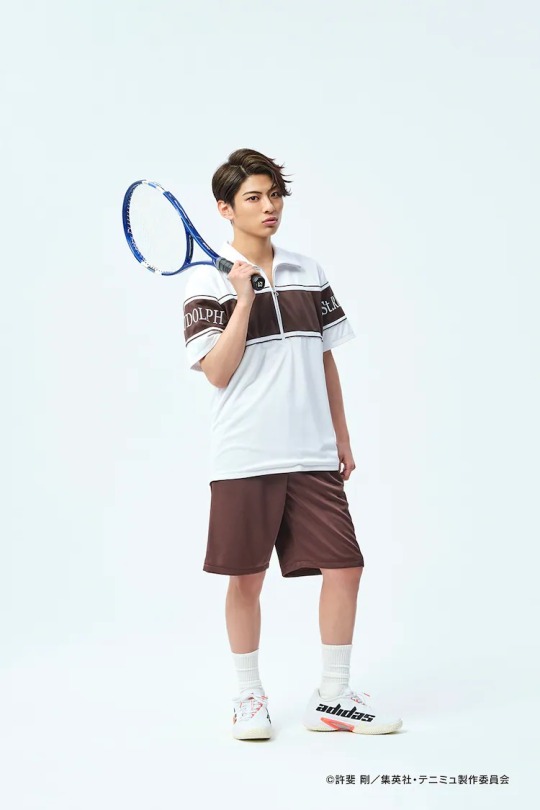
Kubo Yuudai as Yanagisawa Shinya (柳沢慎也)

Satou Rei as Kisarazu Atsushi (木更津淳)

Saezawa Shuuto as Nomura Takuya (野村拓也)
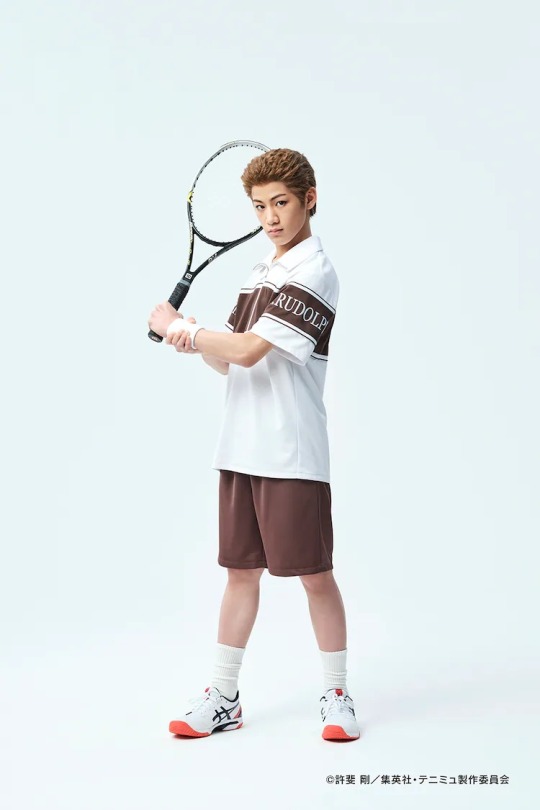
Ishihara Yueto as Fuji Yuuta (不二裕太)

Ninomiya Raimu as Kaneda Ichirou (金田一郎)
YAMABUKI
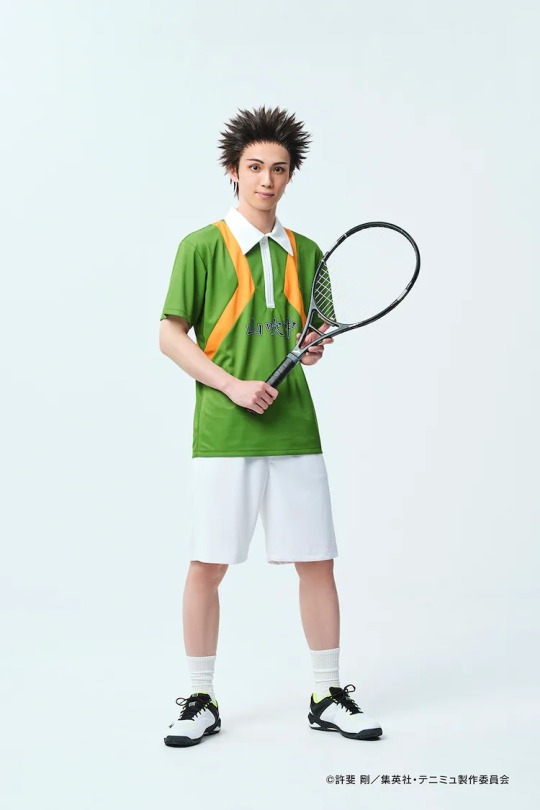
Kuwahara Shou as Minami Kentarou (南健太郎)

TAISEI as Sengoku Kiyosumi (千石清純)
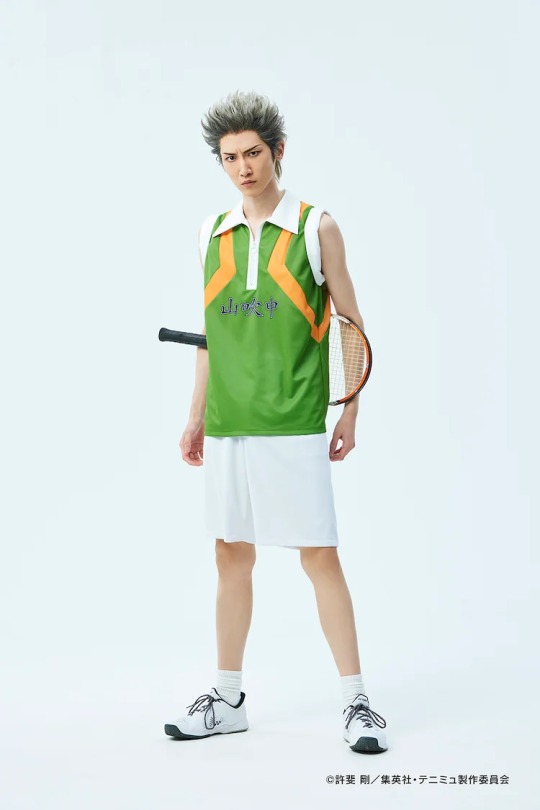
Masunaga Takumi as Akutsu Jin (亜久津仁)
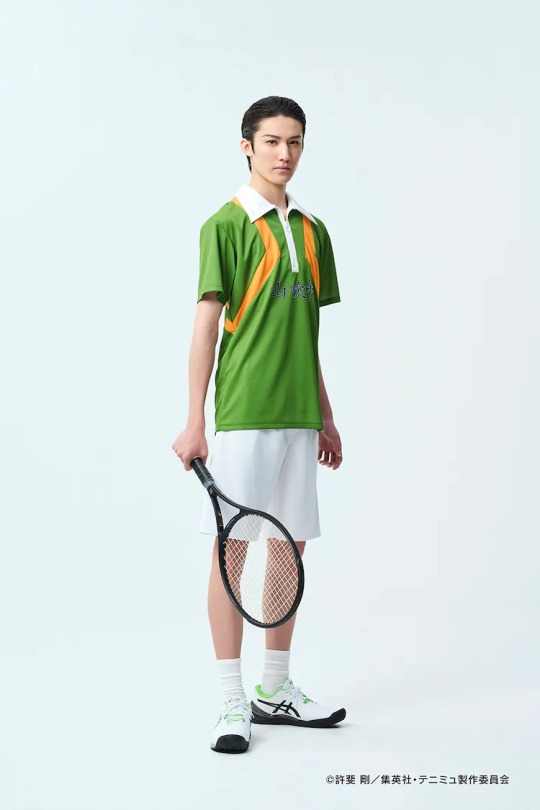
Haitsuka Soushi as Higashikata Masami (東方雅美)
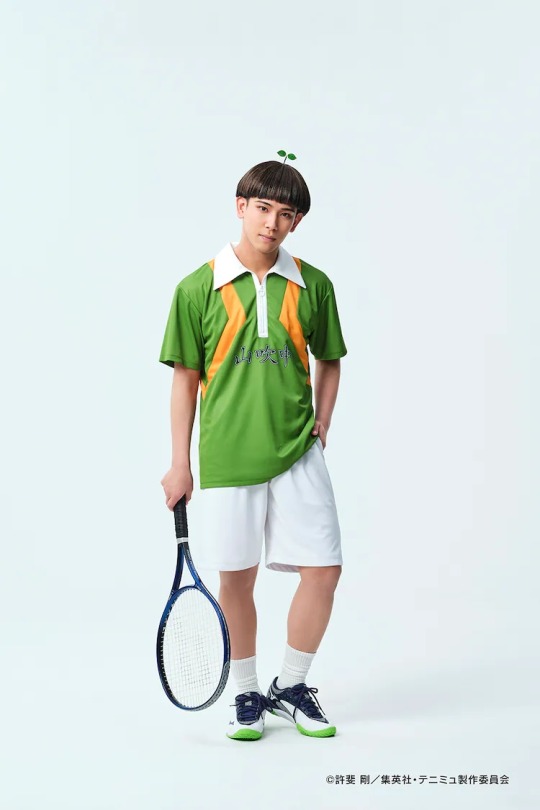
Matsubara Rin as Nitobe Inakichi (新渡米稲吉)
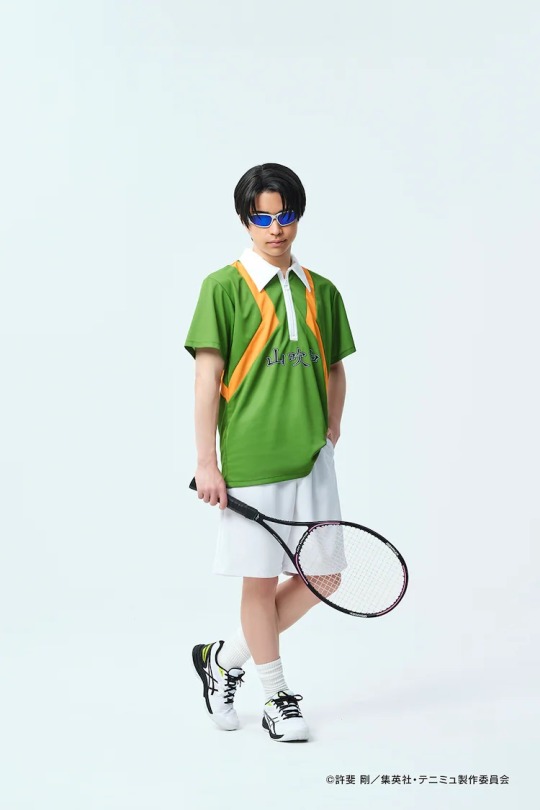
Terashima Reon as Muromachi Touji (室町十次)

Uchino Fuuto as Kita Ichiuma (喜多一馬)
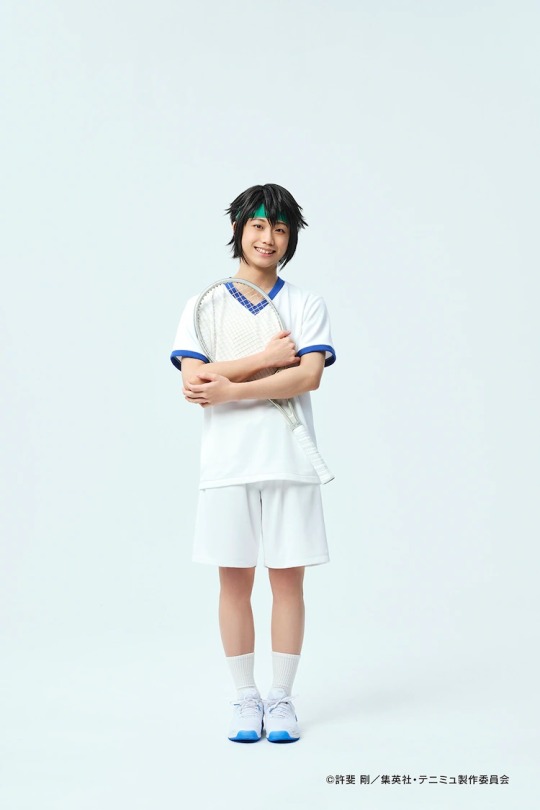
Hashimoto Yuuki as Dan Taichi (壇太一)
FUDOMINE

GAKU as Tachibana Kippei (橘桔平)
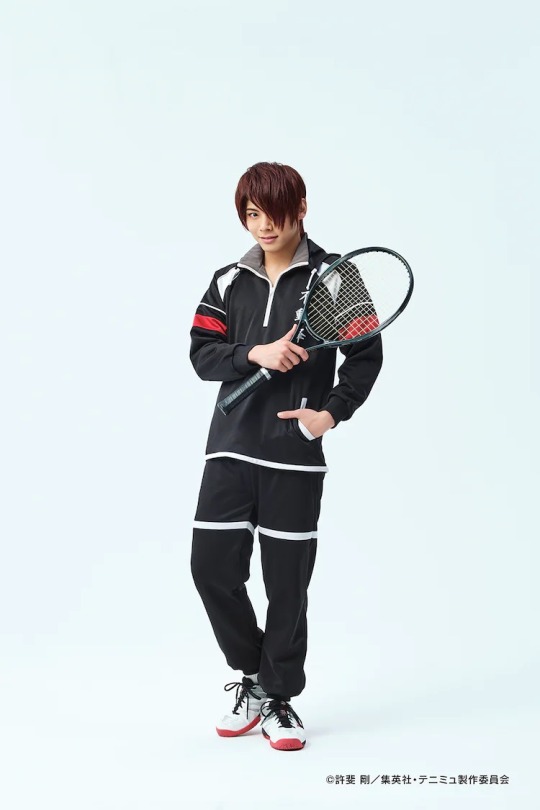
Maiguma Kousuke as Kamio Akira (神尾アキラ)

Tsuchiya Naotake as Ibu Shinji (伊武深司)
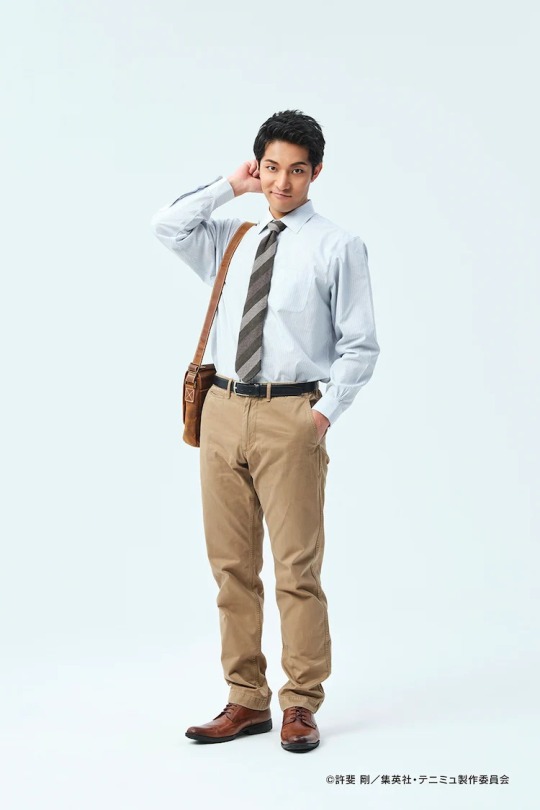
Kitadai Takashi as Inoue Mamoru (井上守)
TENIMYU BOYS

Oono Hiroyuki as Ikeda Masaya (池田雅也)
Akashi Riku Kurihara Itsuki Honma Kazuki
homepage twitter natalie
#テニスの王子様#tennis no oujisama#tenimyu#今牧輝琉#imamaki hikaru#山田健登#yamada kento#原貴和#hara takakazu#持田悠生#mochida haruki#塩田一期#shioda ichigo#富本惣昭#tomimoto soushou#大友海#ootomo kai#寶珠山駿#houjuyama shun#岩崎悠雅#iwasaki yuuga#りょうた#ryouta#白石寿#shiraishi kotobuki#市川愛大#ichikawa manato#奥村等士#okumura hitoshi#久保侑大
11 notes
·
View notes
Text
Otani Injury Confirmation, Surgery; AJPW Champion Carnival 2022 Nights 3 + 4 - 4/11 & 4/13/2022; NJPW Golden Fight Series, Windy City Riot Full Cards; Suzuki v. Samoa Joe on AEW Dynamite Tonight, Dickinson Signs to NJPW
The injury to Shinjiro Otani that occured at ZERO1′s Ryogoku Kokugikan show this past Sunday was confirmed to be a cervical spinal cord injury, specifically in his C3 and C4 vertebrae according to sources. He has remained conscious and able to communicate, and has seen family members through this ordeal, however, remains unable to move his extremities.
Surgery is/was scheduled for today 4/13/2022 to repair any damage they can, and stop any further deterioration. This is similar to what Tomoaki Honma came back from in 2017, or indeed Manabu Nakanishi in 2011. At the same time, the likes of Yoshihiro Takayama or the late Eiji Ezaki (Hayabusa) were never able to recover and return to mobility, let alone wrestling. It’s going to be risky that Otani will be able to stand and walk ever again.
Whatever happens, we wish for Otani’s surgery to go well, and for him to recover and continue to lead a full life, whatever that will entail. We’ll keep you posted.
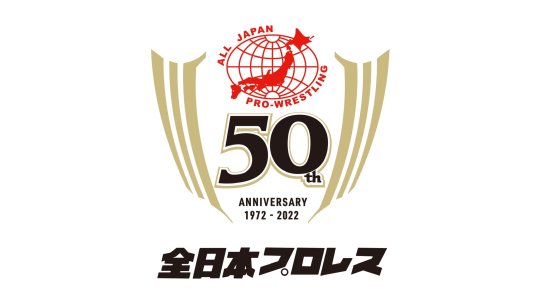
All Japan Pro Wrestling
Champion Carnival continued with matches Monday and today.
- 4/11/2022, Tokyo Korakuen Hall
Takao Omori & Ryuji Hijikata d. Izanagi & Ryo Inoue (Omori > Inoue, Boston Crab, 7:35)
Hikaru Sato & Dan Tamura [Evolution] d. Black Menso-re & Hiroshi Yamato (Sato > Menso-re, Captured Cross Armbar, 9:27)
TAJIRI, Ryuki Honda, Hokuto Omori & Koji Doi [TOTAL ECLIPSE] d. Kento Miyahara, Yuma Aoyagi, Atsuki Aoyagi & Rising HAYATO [NETXREAM] (Honda > Atsuki, Final Vent, 8:44)
Champion Carnival B Block: Yoshitatsu d. Kuma Arashi [TOTAL ECLIPSE] (Jackknife Hold, 9:43)
Champion Carnival A Block: T-Hawk [#STRONGHEARTS] d. Shotaro Ashino [Evolution] (Pret-a-porter, 12:05)
Champion Carnival B Block: Suwama [Evolution] d. Takuya Nomura [BJW] (Lariat, 11:09)
Champion Carnival A Block: Jake Lee [TOTAL ECLIPSE] d. Shuji Ishikawa (D4C, 22:43)
Jake swore he was not losing anymore in the Carnival, and that this is “his time” after being out for three months. Arashi admitted he was not prepared for a jackknife pin taking him out.
- 4/13/2022, Kanagawa Yokohama Hodogaya Public Hall
Yoshitatsu & Izanagi d. Shuji Ishikawa & Ryo Inoue (Yoshitatsu > Inoue, 9:14)
TAJIRI & Hokuto Omori [TOTAL ECLIPSE] d. Takao Omori & Black Menso-re (Hokuto > Menso-re, 7:58)
Yuma Aoyagi, Atsuki Aoyagi & Rising HAYATO [NEXTREAM] d. Suwama, Hikaru Sato & Dan Tamura [Evolution] (Yuma > Tamura, The Fool, 10:45)
Champion Carnival A Block: Shotaro Ashino [Evolution] d. Ryuki Honda [TOTAL ECLIPSE] (Ankle Lock, 9:40)
Champion Carnival A Block: Jake Lee [TOTAL ECLIPSE] d. Shigehiro Irie (D4C, 13:01)
Champion Carnival B Block: Kento Miyahara [NEXTREAM] d. Takuya Nomura [BJW] (Shutdown Suplex Hold, 16:03)
Kento finally gets a win. Nomura started off hot in the Carnival, but has now taken two consecutive losses, hindering his chances of advancing since he only has one match remaining, and yet he still leads the table for now. His remaining match is not until 4/29, the last day of the block matches.
Current Champion Carnival 2022 standings after today:
A Block T-Hawk: 4pts (2W 0D 1L) Ashino: 4pts (2W 0D 1L) Lee: 4pts (2W 0D 1L) Irie: 2pts (1W 0D 1L) Ishikawa: 2pts (1W 0D 2L) Honda: 0pts (0W 0D 2L)
B Block Nomura: 4pts (2W 0D 2L) Miyahara: 3pts (1W 1D 1L) Suwama: 3pts (1W 1D 1L) Arashi: 2pts (1W 0D 1L) Aoyagi: 2pts (1W 0D 1L) Yoshitatsu: 2pts (1W 0D 1L)
AJPW’s next show is on Friday, and then the joint AJPW/NJPW show on Saturday for Korakuen Hall’s 60th Anniversary.
- 4/15/2022, Tokyo Shinkiba 1st-RING
Hikaru Sato & Dan Tamura [Evolution] v. Izanagi & Ryo Inoue
Takao Omori & Black Menso-re v. TAJIRI & Koji Doi [TOTAL ECLIPSE]
Kento Miyahara, Atsushi Aoyagi & Rising HAYATO [NEXTREAM] v. Jake Lee, Hokurto Omori & Yusuke Kodama [TOTAL ECLIPSE]
Champion Carnival A Block: Shuji Ishikawa v. Shotaro Ashino [Evolution]
Champion Carnival A Block: Ryuki Honda [TOTAL ECLIPSE] v. Shigehiro Irie
Champion Carnival B Block: Yoshitatsu vs. Yuma Aoyagi [NEXTREAM]
Champion Carnival B Block: Suwama [Evolution] vs. Kuma Arashi [TOTAL ECLIPSE]
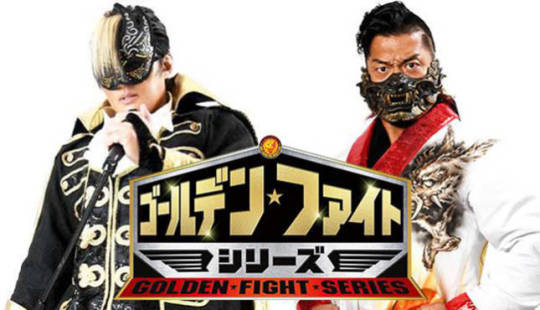
New Japan Pro Wrestling
On Sunday, I posted the full Wrestling Dontaku 2022 card, without listing the Golden Fight Series tour cards before it, that start this coming Monday. Well, here they are:
Golden Fight Series - 4/18/2022, Aichi Nagoya Congress Center Event Hall (NJPWWorld)
Ryohei Oiwa v. Kosei Fujita
Master Wato & Yuto Nakashima v. Yoshinobu Kanemaru & El Desperado [SZKG]
Ryusuke Taguchi & Togi Makabe v. DOUKI & Zack Sabre Jr. [SZKG]
Hirooki Goto [CHAOS], YOSHI-HASHI [CHAOS], Toru Yano [CHAOS] & Tiger Mask IV v. Bad Luck Fale, Chase Owens, Taiji Ishimori & Gedo [Bullet Club]
Tama Tonga [GoD], Tanga Loa [GoD], Hiroshi Tanahashi & Jado [GoD] v. EVIL, Yujiro Takahashi, SHO & Dick Togo [Bullet Club]
Taichi & TAKA Michinoku [SZKG] v. Shingo Takagi & BUSHI [Los Ingobernables]
Kazuchika Okada & YOH [CHAOS] v. Tetsuya Naito & Hiromu Takahashi [Los Ingobernables]
- 4/19/2022, Tokyo Korakuen Hall (Tape delay on NJPWWorld)
Master Wato v. Kosei Fujita
Ryusuke Taguchi v. Ryohei Oiwa
Togi Makabe, Tomoaki Honma & Tiger Mask IV v. Hirooki Goto, YOSHI-HASHI & Toru Yano [CHAOS]
El Desperado, Zack Sabre Jr., Yoshinobu Kanemaru & DOUKI [SZKG] v. Taiji Ishimori, Bad Luck Fale, Chase Owens & Gedo [Bullet Club]
Tama Tonga [GoD], Tanga Loa [GoD], Hiroshi Tanahashi & Jado [GoD] v. EVIL, Yujiro Takahashi, SHO & Dick Togo [Bullet Club]
Taichi & TAKA Michinoku [SZKG] v. Shingo Takagi & Hiromu Takahashi [Los Ingobernables]
Kazuchika Okada & YOH [CHAOS] v. Tetsuya Naito & BUSHI [Los Ingobernables]
- 4/20/2022, Tokyo Korakuen Hall (Tape delay on NJPWWorld)
Yuto Nakashima v. Kosei Fujita
Ryusuke Taguchi, Master Wato, Tomoaki Honma & Tiger Mask IV v. Yoshinobu Kanemaru, DOUKI, Zack Sabre Jr. & TAKA Michinoku [SZKG]
Tanga Loa & Jado [GoD] v. Yujiro Takahashi & SHO [Bullet Club]
Hirooki Goto [CHAOS], YOSHI-HASHI [CHAOS], Togi Makabe & Toru Yano [CHAOS] v. Bad Luck Fale, Chase Owens, Taiji Ishimori & Gedo [Bullet Club]
Taichi & El Desperado [SZKG] v. Shingo Takagi & BUSHI [Los Ingobernables]
Tama Tonga [GoD] & Hiroshi Tanahashi v. EVIL & Dick Togo [Bullet Club]
Kazuchika Okada & YOH [CHAOS] v. Tetsuya Naito & Hiromu Takahashi [Los Ingobernables]
- 4/22/2022, Osaka EDION Arena Subarena
Yuto Nakashima v. Ryohei Oiwa
Ryusuke Taguchi, Master Wato, Tomoaki Honma & Tiger Mask IV v. Yoshinobu Kanemaru, DOUKI, Zack Sabre Jr. & TAKA Michinoku
El Desperado & Taichi [SZKG] v. Taiji Ishimori & Gedo [Bullet Club]
Hirooki Goto [CHAOS] & Tomoaki Honma v. Bad Luck Fale & Chase Owens [Bullet Club]
Tama Tonga [GoD], Tanga Loa [GoD], Hiroshi Tanahashi & Jado [GoD] v. EVIL, Yujiro Takahashi, SHO & Dick Togo [Bullet Club]
Elimination Match: Kazuchika Okada, Toru Yano, YOSHI-HASHI & YOH [CHAOS] v. Tetsuya Naito, Shingo Takagi, Hiromu Takahashi & BUSHI [Los Ingobernables]
- 4/23/2022, Ehime Texport Imabari
Ryusuke Taguchi & Master Wato v. Ryohei Oiwa & Kosei Fujita
Togi Makabe, Tomoaki Honma & Tiger Mask IV v. Hirooki Goto, YOSHI-HASHI & Toru Yano [CHAOS]
El Desperado, Zack Sabre Jr., Yoshinobu Kanemaru & DOUKI [SZKG] v. Taiji Ishimori, Bad Luck Fale, Chase Owens & Gedo [Bullet Club]
Taichi & TAKA Michinoku [SZKG] v. Shingo Takagi & Hiromu Takahashi [Los Ingobernables]
Kazuchika Okada & YOH [CHAOS] v. Tetsuya Naito & BUSHI [Los Ingobernables]
Elimination Match: Tama Tonga [GoD], Tanga Loa [GoD], Hiroshi Tanahashi & Jado [GoD] v. EVIL, Yujiro Takahashi, SHO & Dick Togo [Bullet Club]
- 4/24/2022, Kochi Prefectural Gymnasium
Tiger Mask IV v. Yuto Nakashima
Togi Makabe & Tomoaki Honma v. Toru Yano [CHAOS] & Kosei Fujita
Ryusuke Taguchi & Master Wato v. El Desperado & TAKA Michinoku [SZKG]
Hirooki Goto, YOSHI-HASHI, Kazuchika Okada & YOH [CHAOS] v. Bad Luck Fale, Chase Owens, Taiji Ishimori & Gedo [Bullet Club]
Tama Tonga [GoD], Tanga Loa [GoD], Hiroshi Tanahashi & Jado [GoD] v. EVIL, Yujiro Takahashi, SHO & Dick Togo [Bullet Club]
Elimination Match: Taichi, Zack Sabre Jr., Yoshinobu Kanemaru & DOUKI [SZKG] v. Shingo Takagi, Tetsuya Naito, Hiromu Takahashi & BUSHI [Los Ingobernables]
- 4/25/2022, Hiroshima Sun Plaza Hall (NJPWWorld)
Togi Makabe & Tomoaki Honma v. Tiger Mask IV & Yuto Nakashima
Ryusuke Taguchi, Master WAto & Ryohei Oiwa v. Yoshinobu Kanemaru, DOUKI & Zack Sabre Jr. [SZKG]
El Desperado & TAKA Michinoku [SZKG] v. Taiji Ishimori & Gedo [Bullet Club]
Hirooki Goto & YOSHI-HASHI [CHAOS] v. Bad Luck Fale & Chase Owens [Bullet Club]
Kazuchika Okada, Toru Yano & YOH [CHAOS] v. Tetsuya Naito, Hiromu Takahashi & BUSHI [Los Ingobernables]
NEVER Openweight 6-Man Tag Team Championship: EVIL, SHO & Yujiro Takahashi [Bullet Club] (c) v. Hiroshi Tanahashi, Tama Tonga [GoD] & Tanga Loa [GoD]
Provisional KOPW2022 Championship: Taichi [SZKG] (c) v. Shingo Takagi [Los Ingobernables]
- 4/27/2022, Hiroshima Big Rose
Ryohei Oiwa v. Kosei Fujita
Master Wato & Tiger Mask IV v. DOUKI & El Desperado [SZKG]
Ryusuke Taguchi & Togi Makabe v. Yoshinobu Kanemaru & Zack Sabre Jr. [SZKG]
Hirooki Goto [CHAOS], YOSHI-HASHI [CHAOS], Toru Yano [CHAOS] & Tomoaki Honma v. Bad Luck Fale, Chase Owens, Taiji Ishimori & Gedo [Bullet Club]
Taichi & TAKA Michinoku [SZKG] v. Shingo Takagi & Hiromu Takahashi [Los Ingobernables]
Tama Tonga [GoD], Tanga Loa [GoD], Hiroshi Tanahashi & Jado [GoD] v. EVIL, Yujiro Takahashi, SHO & Dick Togo [Bullet Club]
Kazuchika Okada & YOH [CHAOS] v. Tetsuya Naito & BUSHI [Los Ingobernables]
- 4/28/2022, Yamaguchi KDDI Ishin Hall
Master Wato v. Kosei Fujita
Ryusuke Taguchi v. Ryohei Oiwa
Togi Makabe, Tomoaki Honma & Tiger Mask IV v. Hirooki Goto, YOSHI-HASHI & Toru Yano [CHAOS]
El Desperado, Zack Sabre Jr., Yoshinobu Kanemaru & DOUKI [SZKG] v. Taiji Ishimori, Bad Luck Fale, Chase Owens & Gedo [Bullet Club]
Taichi & TAKA Michinoku [SZKG] v. Shingo Takagi & BUSHI [Los Ingobernables]
Tama Tonga [GoD], Tanga Loa [GoD], Hiroshi Tanahashi & Jado [GoD] v. EVIL, Yujiro Takahashi, SHO & Dick Togo [Bullet Club]
Kazuchika Okada & YOH [CHAOS] v. Tetsuya Naito & Hiromu Takahashi [Los Ingobernables]
Interesting that we have three elimination matches taking place on non-streamed spot shows.
This Saturday is also the NJoA show Windy City Riot, from Villa Park, IL. It turns out I will be attending that after all, I got tickets as a birthday gift (it’s today, if you were wondering! 49, yes!), and I will write this up. It will be my first live wrestling event since AEW Revolution 2020 on 2/29/2020. Good grief.
The show will be shown as PPV on FITE TV and, I think, on NJPWWorld with Japanese commentary. It will end up VOD on NJPWWorld eventually either way. I won’t feel bad about spoiling these results because a) I’ll have been there b) this is a live PPV, not a Strong taping.
Minoru Suzuki will be facing Samoa Joe to defend the ROH TV title tonight on AEW Dynamite; there is a possibility Suzuki v. Ishii will be for that title as well. If so, I hope Ishii knows what the belt is for at this point.
Also, as of yesterday, Chris Dickinson has signed with NJPW.
Here’s what we have:
Windy City Riot - 4/16/2022 Odeum Expo Center, Villa Park, IL (FITE TV)
Rocky Romero [CHAOS] & Wheeler Yuta [AEW] v. Kevin Knight & The DKC
Karl Fredericks, Yuya Uemura & Clark Connors v. QT Marshall, Aaron Solow & Nick Comoroto [AEW]
Chris Dickinson, Ren Narita, Fred Rosser, Alex Coughlin & Josh Alexander [Impact] v. Danny Limelight, Black Tiger, JR Kratos, Jorel Nelson & Royce Isaacs [Team Filthy]
Yuji Nagata v. “Filthy” Tom Lawlor [Team Filthy]
Jeff Cobb, Great O-Khan, Aaron Henare, TJP, Mark Davis & Kyle Fletcher [United Empire] v. Scott Norton, Karl Anderson [Bullet Club], Doc Gallows [Bullet Club], Chris Bey [Bullet Club], Hikuleo [Bullet Club] & El Phantasmo [Bullet Club]
Chicago Street Fight: Juice Robinson, David Finlay Jr. & Brody King [AEW] v. JONAH, Shane Haste & Bad Dude Tito
U-S-Of-Jay Open Challenge: Jay White [Bullet Club] v. X
Tomohiro Ishii [CHAOS] v. Minoru Suzuki [SZKG]
Jon Moxley [AEW] v. Will Ospreay [United Empire]
I was going to post this yesterday, but decided to wait for several reasons. I don’t think I will be posting tomorrow, so this is it until Sunday. I’ll have a report about Windy City Riot at that time. Take care.
#Shinjiro Otani#all japan pro wrestling#AJPW#champion carnival#kento miyahara#jake lee#Takuya Nomura#new japan pro wrestling#golden fight series#windy city riot#new japan pro Wrestling of America#Minoru Suzuki#samoa joe#AEW#aew dynamite#chris dickinson
0 notes
Text
JG Summary 1-4 Mato
Mato, or the Devil’s City. 1940.
Disclaimer: 1. I assume everyone knows what’s already in the anime. 2. The information is based on the Chinese novel, I do not claim credit for translation. 3. Everything is quoted. My comments are in parenthesis. 4. Please do not post outside of tumblr. 5. Corrections are welcomed.
Main Character: Yukihito Kusanagi (行人 草薙)/ Fukumoto (福本)
Note on the title
Mato, or 魔都, is a name given to Shanghai, specifically the Shanghai Concession, by Japanese around the 1930s. If you remember 魔王 as the devil king, 魔都 would be the devil’s city, or sin city if you prefer. The word “魔都” is revived in China today as a slang for Shanghai.
Another disclaimer, the military ranking may not be accurate, as it is very confusing trying to match Japanese and English terms, when I can only refer to Chinese terms. So any corrections are welcomed.
Story is told from the perspective of Sergeant Eiji Honma. The anime follows the novel quite closely, so I’ll just be focusing on the characters rather than the whole plot. I will still add details in the end to give you guys a flavor but you should really just wikipedia as I do not intend to write a history essay.
List of characters:
- Eiji Honma (英司 本間) (Honma): Storyteller, former officer of the Tokubetsu Kōtō Keisatsu in Japan (特別高等警察, or literally Special Higher Police, the Japanese secret police. See bottom of the post for notes). Transferred to Shanghai Kenpeitai 3 months ago and has difficulty adjusting to the locality. He is tasked by Captain Oikawa to investigate internal information leaks.
- Masayuki Oikawa (政行 及川) (Oikawa): Captain of Shanghai Kenpeitai. Relatively slender and delicate build for a soldier, engaged to the daughter of Lieutenant General Yokozawa and about to get a promotion.
He was known to be a perfectionist and a mysophobe, but this eventually led to his mental demise in the 5 years working in the Western Shanghai District, the most dangerous area of all Shanghai. He states that 5 years is too long. He fell for gambling, drinking, whoring, and agreed to secretly exchange opium kept by the Kenpeitai for his own pleasure. It is revealed that he sells military intelligence as well. To hide his crimes, he instigated a robbery of the Kenpeitai’s opium warehouse, hired a boy from the casino to kill Nobuteru Miyata, then blew up his own house so the series of events looked like the works of anti-Japanese terrorists.
There is a detailed analysis of Oikawa’s background and the historical locations in present day real life by the same person I linked last time, in Chinese. Please note that the photos of Shanghai are taken by the author herself and should not be reproduced without her permission.
- Nobuteru Miyata (伸照 宮田) (Miyata): Sergeant Major of the Shanghai Kenpeitai, killed not long ago in the alleys, shown in the beginning of the anime episode 4. He was originally investigating the missing opium from the Kenpeitai, before secretly killed.
- Yutaka Yoshino (豊 吉野) (Yoshino): Leading Private of the Shanghai Kenpeitai. He is Oikawa’s accomplice in smuggling opium. However in the end the poor guy killed Oikawa for killing his lover.
- Hajime Shiotsuka (朔 塩塚) (Shiotsuka): Graduate from Tokyo Imperial University, present day Tokyo University, and currently a writer for a Japanese newspaper based in Shanghai. As a student he was caught by Tokuko (特高) police reading a left-wing magazine, but quickly broke and swore repentence (…) after some questioning and was subsequently released. He left China some time before Honma’s encounter with Fukumoto, who used him as a disguise.
- Yukihito Kusanagi (行人 草薙) (Kusanagi): D-Agency spy of the episode. Graduate from Tokyo Imperial University, classmate of Shiotsuka. He is identified by Shiotsuka as a D-Agency spy, although the Shiotsuka that Honma meets is probably Kusanagi in disguise. In the anime, Kusanagi is Fukumoto.
Kusanagi is described as extremely smart in school, a mysterious loner, with a fair, cold face like a mask. No one knows anything about his family, though some students speculated he is a bastard of an important guy and a geisha. There is no evidence for this. It is also rumored that after graduating with exceptional grades he continued to study somewhere abroad.
When Honma looks at Kusanagi’s graduation photo, he notes that his face is not one of an extremist, those he usually dealt with in the Tokko days. Although the photo is a front picture, it feels as if Kusanagi is looking sideways. While the photo is taken for an entire group of students, it seems as if his personal picture. Honma realizes that Kusanagi has the expression of egotist who believes in noone but himself, aperson who takes huge risks and difficult tasks just because he can.
(This is a possible background for Fukumoto, except for the fact that the Shiotsuka describing this is probably Kusanagi/Fukumoto himself. No doubt he is using Honma, but he may be playing with him as well, as I’ll mention on a later point, but the graduation photo seems real. It is possible that Yukihito Kusanagi is his real name).
———————-
Notes:
Tokkō (特高): the Japanese secret police that patrols the country for communist suspects. They are called Peace Police but are known more notoriously as Thought Police. They are initially a division of the Home Ministry but was added to the command of the Kenpeitai in occupied regions. Before WWII every Japanese embassy in China had a police department with a Tokko division. (Honma worked as a Tokko officer in Japan, but is not a Tokko when transferred to Shanghai).
Shanghai International Settlement: The following is an introduction from wikipedia.
The settlements were established following the defeat of the Qing army by the British in the First Opium War (1839–1842). Under the terms of the Treaty of Nanking, the five treaty ports including Shanghai were opened to foreign merchants. Unlike the colonies of Hong Kong and Weihaiwei, which were sovereign British territories, the foreign concessions in Shanghai originally remained Chinese sovereign territory. However, the Qing government gave up sovereignty in the concessions to the foreign powers in exchange of their support to suppress the rebellion in 1853-1855. The following year the British and American settlements formally united to create the Shanghai International Settlement. As more foreign powers entered into treaty relations with China, their nationals also became part of the administration of the settlement, but it always remained a predominantly British affair until the growth of Japan’s involvement in the late 1930s.
The Marco Polo Bridge Incident: September 7th, 1937.
Also known as the July 7th Incident, the Lugou Bridge Incident. (七七事变、卢沟桥事变)
The battle marked the beginning of Japanese invasion of North China and the Second Sino-Japanese War from 1937 to 1945, which is also part of the Pacific front of WWII. The story of Mato or Episode 4 takes place in 1940, which means China and Japan had been in state of war for years. The novel notes that since then the British have been favoring the Chinese government in Chongqing and tends to turn a blind eye to anti-Japanese activity in Shanghai.
The Battle of Shanghai: August 13th, 1937.
This was one of the largest and bloodiest battles of the entire war, described by Peter Harmsen as “Stalingrad on the Yangtze”. The Chinese and Japanese were fighting in Shanghai for 3 months before the Japanese took control of city. After the battle, the originally bustling Zhabei and Nanshi Districts were destroyed, the Chinese area of the Shanghai concession became essentially slums, the international settlement north of Suzhou River was seriously damaged and occupied by Japan. The settlement south of the River, as well as the French part of the concession, was left out of the battle and continued an eerie four-year prosperity called the “Lone Island Era (孤岛时期)”. The Western District of Shanghai, under Japanese control, became the hotbed for crime, which is where the soldiers in the novel are working.
Yuuki’s designs for Shanghai:
(Note: In the anime, it is revealed in the end that, by encouraging a person from the Kenpeitai to deal with Kenpeitai’s internal issues, the Agency helped the Kenpeitai save face and thus, the army has agreed to Yuuki’s plans. However it does not say what the Yuuki’s plan is, possibly because of the time limit, or because it involved a good deal of political and historical complications. In the novel, Shiotsuka told Honma their plan, and Honma reasons it out in considerable detail.)
The plan: 2.5 billion fake notes of Chinese Yuan brought into Shanghai, to be distributed throughout the country. According to the novel, this is worth the sum 3 years of Chinese military expense in 1937. Numbers aside, this is intended to wreck the Chinese economy with inflation, destroy the currency’s credibility, and ultimately prevent them from importing weapons and raw materials from abroad.
While supposedly this plan can win the war without a fight, not only the army, but also the public if they ever get to know about it, will definitely accuse the plan as being utterly dispicable.
The Green Gang(青帮): To carry out the currency warfare it is also rumored that the D-Agency will be cooperating with the Green Gang in China. They are a secret society unrelated to national sovereignty, similar to the Japanese Yakuzas. While there were historically many secret societies in China, the Green Gang based along the Yantze River and in Shanghai are said to be the most powerful yet and now commands China’s underground economy. The Green Gang’s primary source of income is opium. Honma remembers how much damage opium has already caused in China and how unsettled he feels every time he passes an opium den in Shanghai.
The War: Honma believes that the objective of war was supposed to be freeing Asian people from the oppression of European imperialists. He then wonders why the war has come to this distasteful state.
Looking at Kusanagi’s photo again Honma feels like Kusanagi is looking down upon the whole world, laughing at every existence. He then remembers several words: daemon, devil, dangerous, darkness. Honma ponders about the meaning of the name “D” agency, but stops himself from overthinking and leaves the scene.
At the end of the chapter, Honma is in Oikawa’s office watching the dead bodies, and he sees the bodies of two men bewitched by Mato, Shanghai, the Devil’s City. A question is raised: “will you be able to handle situations like this?” The final sentences describes a pair of eyes peering at Honma from the dark.
Note: speculations on why Kusanagai/Fukumoto gives Honma Kusanagi’s name
1. He may need a second alias becausing leading Honma to the night club under the name Shiotsuka could perhaps cause unnecessary suspicion. 2. He needs an alias that interests Honma enough to make Honma follow his lead. 3. He announces the presence of the D-Agency as a headsup or warning for Honma to keep an eye out as the agency will continue their surveilling, and they may need direct cooperation from the Kenpeitai in the future.
Or 4. Kusanagi/Fukumoto is playing with him because he can.
A funny note: when disguised as Shiotsuka, he states that even if Honma learns all the languages and habits involved in Shanghai culture, locals will still be able to tell a Japanese apart from sight. The way they wear their clothes could be different, even they way they wash their faces are different. At this point Honma asks about what is the difference. Shiotsuka demonstrates that while the Japanese have their hands closed, moving up and down their faces, the Chinese move their faces up and down their hands. Honma takes note of this.
I will say this as absolute nonsense. Bet 99% that Shiotsuka/Kusanagi/Fukumoto is just playing with the poor sergeant.
@jgfiles
30 notes
·
View notes
Text
Joker Game Tarot
The same lovely user who submitted this has also submitted this. This was submitted a while ago and I apologise for the delay, but this was an interesting read and feel free to add your own thoughts.
While some are quite clear to understand from the name, I’ve added a few words associated with the card’s meaning to all just in case they might seem confusing.
Card No.0: The Fool - Kaminaga
Beginnings, innocence, spontaneity, a free spirit, unlimited potential.
Card No.1: The Magician - Lieutenant Colonel Yuuki
Power, skill, concentration, action, resourcefulness.
Card No.2: The High Priestess - Jitsui
Intuition, Higher powers, mystery, subconscious mind.
Card No.3: The Empress - Nogami Yuriko
Femininity, beauty, nature, abundance, harmony, luxury, beauty and grace.
Card No.4: The Emperor - Lieutenant Colonel Wolff
Authority, father-figure, structure, solid foundation.
Card No.5: The Hierophant - Gamou Jirou
Group identification, conformity, tradition, beliefs.
Card No.6: The Lovers - Aaron & Ellen Price
Love, union, relationships, values alignment, choices.
Card No.7: The Chariot - Hatano
Control, will power, victory, assertion, determination.
Card No.8: Strength - Synthia Grane
Strength, courage, patience, control, compassion.
Card No.9: The Hermit - Fukumoto
Soul-searching, introspection, being alone, inner guidance.
Card No.10: Wheel of Fortune - Amari
Good luck, karma, life cycles, destiny, a turning point.
Card No.11: Justice - Honma Eiji
Justice, fairness, truth, cause and effect, law.
Card No.12: The Hanged Man - Sakuma
Suspension, restriction, letting go, sacrifice.
Card No.13: Death - Miyoshi
Endings, beginnings, change, transformation, transition.
Card No.14: Temperance - Tazaki
Balance, moderation, patience, purpose, meaning.
Card No.15: The Devil - Oikawa
Addiction, sexuality, materialism, detachment, breaking free, power reclaimed.
Card No.16: The Tower - Lieutenant Colonel Kazato
Disaster, upheaval, sudden change, revelation.
Card No.17: The Star - Alan Lernier
Hope, spirituality, renewal, inspiration, serenity.
Card No.18: The Moon - Odagiri
Illusion, fear, anxiety, insecurity, subconscious, confusion.
Card No.19: The Sun - Emma Grane
Fun, warmth, success, positivity, vitality.
Card No.20: Judgement - “Coffin”
Judgement, rebirth, inner calling, absolution.
Card No.21: The World - D-Agency
Completion, integration, accomplishment, travel.
( Ah… How nice would it be if someone draws Joker Game tarot cards…) I would very much love to see that as well
#Joker Game#yuuki#Kaminaga#Jitsui#Hatano#Amari#Fukumoto#Sakuma#Miyoshi#Tazaki#Odagiri#gamou#Emma#Wolff#queued post
212 notes
·
View notes
Photo

8 more of my #inktober coloured ❤ 🔸️Keith - Voltron 🔸️Yuna and Eiji - Sword Art Online Ordinal Scale 🔸️Honma - Anohana 🔸️ Georgie - IT 🔸️Shima - Aoi no Exorcist 🔸️ Horikawa - Touken Ranbu Katsugegi 🔸️Ken - Weiß Kreuz
0 notes
Text
Re-watching Joker Game: Ep 4 City of Temptation
So, as I proposed a re-watching, here I go continuing on doing the re-watching. Hopefully someone else will join! ^_-
Also, hopefully there’s someone out there that read all this stuff… as I know it’s pretty long… shame on me for analyzing things too in deep…
Mind you, what follows are my ramblings over Ep 4, comprehensive of my impression on how the frames were structured and so on with some occasional reference to the other Joker Game media.
Also, for personal comfort, I’ll use the characters’ names even if the anime hasn’t stated them yet. In short, as this is a re-watching and not a first watching, you’ll also get a telling that’s mixed with my knowledge of the future. Consider yourself warned.
And now, let’s start.
So yes, like in the previous episode I starts with the preview for this episode that was in Ep 3.
Now, we’re again in whatever place the previews take place.
Anyway in this preview we’ve Fukumoto and Jitsui seated at the same table.
Fukumoto is playing with a coin, tossing it in the air and catching it. Jitsui seems to be studying him as he claims Fukumoto has really been into gambling lately, hasn’t he?
Fukumoto agrees and Jitsui asks him why.
Fukumoto replies that it’s to taste the thrill of victory and the agony of defeat. Although he’s smiling as he says so, it doesn’t seem that much of a happy smile and before he had looked bored. All the D Agency boys are well above the top in matters of ability and intelligence. Sure, although some tend to forget it, they also learned new stuff at D Agency, so maybe some of them didn’t join D Agency being already proficient in self defence, foreign languages, opening safes and so on. We know from the novels that some D Agency students had no experience with self defence, one of the topics taught at D Agency. But what the novels also tell us is that they could pick up skills in an extremely fast manner.
Why all this rambling?
Because when you’re too good, sometimes this end up making you cut out by others and, at the same time, strip you of the enjoyment of your achievements because there was little or no effort in reaching them.
In this tiny exchange with Jitsui, Fukumoto gives me this impression. He was the sort of guy who was so very good everything started to bore him and so he turned toward things that could give him stronger emotions.
Of course, Fukumoto’s ‘boredom’/’emptiness’ might come from other things (*chough* Odagiri left *cough*) but it’s still an interesting speculation how Fukumoto, who seems so emotionless on the outside, might actually feel like ‘something’ is missing in himself and trying to fill it with stronger emotions.
It’s also interesting how it’s Jitsui, who’s notorious from having two faces (the sweet one and the sadist one), is asking him that, as if he’s trying to see if under Fukumoto’s apparently expressionless face there’s actually something else.
And now let’s dig into the episode.
Shanghai’s night view.

As we’re shown a lot of people walking, on better their feet, ‘Tansaku’ [探索 Search] starts playing, immediately increasing the tension. The next shoot shows us the faces of those who were walking. They’re all smiling but, although they’re smiling they don’t come out as friendly. Somehow it’s as if they’re smiling at us, looking creepy, the camera slightly below them so that they also seem imposing.

We see again lot of people walking then… the crowd seem to open up a little to show us a person, likely a boy, looking around himself suspiciously and then entering in a dark alley. Short after someone, a man, follows him there.
While the streets showed us people who were smiling and well dressed as they walked the alley has plenty of dirty people seated on the ground with a vacant expression.

Quite a sharp contrast. The man keep on running, and he’s clearly following the boy who’s turning into another corner. By the way he acts, he’s not just following him or chasing him, he’s trying to shadow him.
Interesting enough so far we weren’t shown the face of either of them, the camera careful not to show them when finally we see the face of the shorter of the two as he made another turn and yes, he’s a boy.

Differently from the other people he doesn’t seem to have marked Chinese traits (though he could be Chinese anyway). Next we see the man in suit. His features are rather standards and not too noticeable as he chases the boy and… all of sudden realizes he has lost him. The camera gives us a close up of his face and yes, he doesn’t seem that noticeable. If we want he vaguely resembles Gamō. He’s looking around, searching for the boy but can’t see him.

We do see the boy though. He’s behind him and he’s raising a gun, pointing it at the man. The gun fires.


We’re again shown the people walking on the streets, well dressed, smiling and totally uncaring of how a bullet has been shoot just now.
The man falls on the ground slowly, the boy having shoot him straight in the back. The boy escapes.
The camera stands above the fallen man, showing us a pool of blood enlarging under him. It then moves to his face. His eyes are wide and unseeing, blood is coming out from his mouth. He’s clearly dead.

‘Kikan’ [機関 Agency] starts and we gets Fukumoto telling us the same shortened version of Sakuma and Odagiri’s explanation of what D Agency is.
Then this ends and we get…
…the opening. Which is the same as usual. Fukumoto is the sever spy that appears in it and he’s tossing a coin in the air. It’s fun how in both the preview and the opening the importance of that coin is remarked yet many ended up on forgetting it.
Anyway the opening ends and we resume with ‘Joker Game’.
Shanghai again, but it’s a sunny day now and we get to see more shoots of the city, which hints at how Japanese people were probably interested in seeing more of Shangai (while they could care less about London, Paris or Berlin of which we only see landmarks or relevant shoots…)



Then we see the building that host the Kosei unit of the Japanese military police (Shangai back then was split so the Japanese weren’t the only one who took care of it).

Just to make us sure we know what that building is, we also see a sign telling us so, with a Japanese Military Policeman standing in front of it, clearly guarding it.

Next we see it’s the inside of the place, a fan moving slowly and, below him, a military policeman.

His expression reminds us of when Sakuma was standing at attention in front of Mutō and his grades identify him as a sergeant. He’s not what we would call aesthetically pleasing, though he’s not ugly and the tip of his nose is slightly reddish even though he’s not drunk.
He’s sweating, though we don’t know if it’s due to the hot weather (this episode takes place in summer, hence that’s why the fan was moving) or due to the tension.
Another Military Policeman, seated on a desk, finishes reading something, probably a report, then set it down and, apologizes to the sergeant, whose name we learn is Honma, telling him he didn’t mean to keep him waiting, smiling to him. Undoubtedly he looks WAY NICER to Honma than Mutō was with Sakuma.
Honma, straightening up further, politely waves away his apology and asks him what he can do for him. Yes, he sounds tense. He refers to the other policeman as Oikawa Taii-dono.
‘Taii’ means ‘captain’, so if he has just said ‘Oikawa Taii’ he would have merely called him ‘Captain Oikawa’ (in Japanese you put the ranking AFTER the name) but then he felt the need to add ‘-dono’. ‘-dono’(殿) is an honorific suffix. Nowadays it’s more respectful than ‘-san’(さん)but less than ‘-sama’(様)and it’s used when doing business, writing letters, and meeting customers or guests, occasionally also employees or for a person who has general authority over others.
In the past ‘-dono’ used to mean ‘Daimyo’ – the leader of Samurai. Japanese is an evolving language so I couldn’t find exactly what ‘–dono’ exactly meant in Joker Game time (I discussed in the past of how ‘Kisama’ back then had a different implication than the one it has nowadays).
In the manga we see that Yoshino too uses ‘–dono’ when talking about Oikawa.
It’s worth to note that Sakuma doesn’t use it to talk with Mutō, who’s just Colonel Mutō (Mutō Taisa) even though a Colonel has a ranking much higher than a Captain, and that when Kazato talks with Akutsu he uses a different suffix (Akutsu-kakka(阿久津閣下)which means ‘his Excellency Akutsu’) forgoing his ranking.
Long story short there’s probably an extra layer of implication in Honma’s (and Yoshino’s) choice to use ‘-dono’ that implies a marked respect for the man, which can go from the fact that he’s the commander of the whole district or to the fact he’s going to marry Lieutenant General Akutsu’s daughter (in the anime, in the novel it’s Lieutenant General Yokozawa's daughter) so he might be someone from a high class family. Or maybe it’s just because, differently from Sakuma who’s a commissioned officer, Honma and Yoshino are merely enlisted officers and therefore need to pay Oikawa an extra dose of respect. No idea but I welcome suggestions and additional info.
Oikawa tells Honma he summoned him because he has a top-secret job for him, then reveals there’s an enemy spy in the Shanghai Military Police and he wants Honma to discover who he is. Honma asks why him, since he has been only stationed in Shanghai for three months. This bit is interesting because, either Honma is pushing his luck and Oikawa is feeling generous or it proves soldiers, or at least military policemen, could ask for explanations.

Anyway Oikawa says that’s exactly why he has chosen Honma and, at hearing this, Honma loses his posture a bit as he lowers his head to finally look at Oikawa in surprise (remember? Sakuma too didn’t look at Mutō when reporting to him… I guess that was the posture in which one did the reports… and the shift in it is meaningful).

Anyway Oikawa explains that since the leaks started a little over three months, and therefore before Honma arrived, this proves Honma couldn’t have been the culprit. The fact that Oikawa has an excuse ready for his choice again proves Honma was allowed to question him. Also, Oikawa adds, he had heard Honma served in the Special Higher Police when he was in Japan.
The Special Higher Police (特別高等警察 Tokubetsu Kōtō Keisatsu), often shortened to Tokkō (特高 Tokkō), was a police force established in 1911 in Japan, specifically to investigate and control political groups and ideologies deemed to be a threat to public order. Its main function was as a civilian counterpart to the Military Police (憲兵隊 Kempeitai) which was not a conventional military police, but more of a secret police and Special Police Corps (特別警察隊 Tokubetsu Keisatsutai or 特警隊 Tokkeitai) the Imperial Japanese Navy's military police, also known as the General Affairs Section which concerned itself with police and personnel work within the Navy.
In short it was the civilian police versus the other two which were the Army and the Navy polices.
I guess the idea here is that Oikawa is implying that, although Honma has joined the Military Police only by three months, he’s not exactly new to police work as he worked for the civilian police before… though there could be more subtle allusions to the Special Higher Police work than what I could figure out.
Oikawa goes on claiming that he assigned this task to another man previously, but the guy was killed just yesterday. He then shows Honma a photo depicting the dead body of the man we saw murdered at the beginning of the episode, which, it turns out, was the Military Police Corporal Miyata Nobuteru.
Oikawa then hands Honma Miyata’s reports. Honma is about to take them when an explosion causes him to fall on the ground.

At this Oikawa scolds him immediately asking him what he’s doing. In fact Oikawa is already at the window, watching what was going on outside.

Honma stands immediately while apologizing and rushes to the window (on which we could see a beautiful reflection of the clouds for a split second), which he opens.
‘Senpuku’ [潜伏 Latent] begins playing.
Oikawa picks up a binoculars and hands it to Honma, telling him to confirm the location. Honma claims it’s the International Settlement. Oikawa, who was also watching the scene with a binoculars, lower it cursing. Honma turns toward him surprised and, at this, Oikawa admits that what had blown up was his house.
In the next scene we see the place of the explosion. There are houses with broken windows, curious people, Indian policemen as well as the Japanese Military Police and bodies covered by mats.

It’s worth to mention that the Indian Police there isn’t working for the Japanese but for the English as, as already mentioned, the Japanese weren’t the only foreigners in Shanghai.
Honma and Oikawa are checking the bodies, now completely burned, under the mats. Honma finds what had happened to them horrible. Oikawa recognizes the first person as the maid who came to his house daily. A new person asks him who are the rest. Oikawa and Honma turns toward the speakers who turns out to be…

…and Englishman, which Oikawa identifies as Inspector James. Oikawa replies that two of the others are beggars who used to sit in front of his home, while the other is a child who lived nearby and who often played behind his house. As for the last, Oikawa claims he has no idea.
James here immediately sets himself up as a ‘bad guy’ as he tosses the butt of the cigarette he was smoking over a mat and claims that the person under it is the most suspicious one before crushing the butt of the cigarette under his shoe and therefore stepping on the corpse under the mat as well.

Oikawa and Honma are surprised by his action, Honma keeping on staring at the foot on the corpse while Oikawa asks clarification about why the beggar would be the most suspicious, wondering if James is saying the beggar is behind the terrorist bombing.
James claims the beggar probably merely had a cook fire going or something and that it must’ve caused the paint can sitting by the wall to blow up. To be honest there’s a pain can, or better what remains of it on the ground.
Honma is furious and complains that was clearly a terrorist making an attempt on Oikawa’s life, especially since the day before… I guess he was about to mention how Corporal Miyata was killed or the fact the day before too there was a terrorist attempt but Oikawa cut him. Honma silences himself but it’s clear he’s restraining himself.
The camera moves on James, smiling smugly and cruelly.

In case we hadn’t got it by ourselves Oikawa tells Honma it’s pointless to insist as James never had any intention of investigating this incident. In fact for the English side it was rather convenient if act of terrorism were committed against the Japanese so they’ve no interest in investigating.
In all this it’s worth to note how Oikawa keeps calm and polite. He seems an admirable person who even felt sorry for the kid who died. His good looks also help to make him look like a good person. By contrast, while James isn’t outright ugly, he’s not good looking and his behaviour is extremely rude and unsympathetic, which helps Oikawa to stand out more as an ‘apparently good person’.
James then claims that settles it and leaves.
Oikawa admits he left early in the morning because he had to talk with Honma, but if he had left to his usual time… he trails off but the implication is that if this had been the case he would have died in the bombing attempt. Honma is sweating, differently from Oikawa. Again this is likely because he feels the heaviness of the implications and not due to the heat.
Oikawa adds this might mean his schedule was leaked and add he’ll leave what they had discussed (the investigation) to Honma.
‘Senzai’ [潜在 Potential] begins playing.
The two salutes each other then Oikawa leaves. Honma looks around to the bystanders and, as he does so, he notices that the only other Japanese military policeman on the scene is staring to a corpse with a sad expression on his face without moving. He is Private Yoshino and Honma asks him what’s wrong. Look well at Yoshino’s expression. The close up lasts a second but he’s clearly suffering here.


Yoshino is surprised and straighten up. Honda asks him if he knows the deceased but Yoshino denies it. The two salutes and Yoshino as well leaves. Maybe it’s just an animation mistake but normally so far we saw that when guys in uniform wearing a sword walk, they hold their sword still. Yoshino doesn’t. As said before it could be an animation mistake or a hint he’s so shaken he forgot doing so.
Honma, just to make sure, looks at the corpse below the mat. It’s too charred to be recognizable but we can see it has a butterfly tattoo on its chest.


p>Again Honda looks around and sees among the bystander a man waving at him, a big smile on his face.

Honma is surprised. The camera moves on the waving guy’s face but he would look unknown to us viewers as well and not just because we can’t really remember Fukumoto that well considering his small role in Ep 1 & 2 (after all we saw him in the preview which gives us a nice close up of his face, we could use that as reference) but because Fukumoto is well disguised, even better than Hatano.

First of all he has tanned up his skin then he’s wearing glasses that also change the shape of his eyes, pulling their corners down and making them look more droopy than they are. This is a huge change to normal anime disguises, in which usually wearing glasses would be enough.
We go back to the Military police station and the waving guy, whose voice sounds much more friendlier and livelier than what we heard of Fukumoto claims it has been a long time from the last time they spoke to each other and that he’s in debt for all that Honma did for him. This gives us the impression that Honma should know that guy and therefore that he CAN’T be a D Agency student as they sort of left their past behind them. Of course the fact he’s handing his card to Honma hints at how he’s not Honma’s close friend or something, more like a casual acquaintance.
In fact Honma first read his card to discover his identity and see that the guy in front of him is supposed to be Shiozuka Hajime, a writer from Shanghai Nichi-Nichi News…

…he then stares at him and finally remembers he investigates him on charges of operating a left-wing magazine because, remember? Honma previously worked for the Special Higher Police, whose duty was to investigate and control political groups and ideologies deemed to be a threat to public order. Left-wing ideas were deemed as threats at the time.
Shiozuka confirms it was three years ago. Mind you, the novel will clear up that yes, a Shiozuka Hajime exists and Honda investigated on him… but that one isn’t Fukumoto. Fukumoto just disguised himself as Shiozuka Hajime. This makes contacting Honda easier for him, as he can claim to know him and to be on his side since he’s indebted to Honda but also makes easier for Fukumoto to disguise as Shiozuka as Honda didn’t know him well and last he saw him was three years ago. It also provides Fukumoto with various advantages we will see soon.
Honma expresses his hope Shiozuka has turned over a new leaf and started working a respectable job and Shiozuka confirms he did, claiming it’s more respectable than anything he did before and, to prove it to Honma, shows him a newspaper article claiming he wrote it and that, in it, there’s not a single word that would paint the Japanese army in an unfavourable way, hinting to us that this is what previously got him in troubles.

A break here to point out how cool it was the idea to give Shiozuka’s role to Fukumoto since its behaviour contrasts so sharply with Fukumoto’s usual one I would bet not even his mom would recognize him.
So, as I said, presenting himself as Shiozuka gives Fukumoto advantages. One of them is placing a newspaper under Honma’s nose so as to remind him that the day before, when another terrorist attempt happened, the building attacked was destroyed by MORE THAN ONE ROUND, and, just in case the reminding by showing him the newspaper article wasn’t helpful enough, Shiozuka/Fukumoto also verbally pointing that out.
In short Fukumoto can start with telling Honma how odd it is that this time there was only a round.
Honma though seems to be feeling only the pressure of the gravity of the situation and so, as he resumes sweating, he tells Shiozuka he already knows about this. Fukumoto smoothly pulls back, claiming he sees he’s preaching to the choir but still tries to nudge Honma further by reminding him that the target of that last bombing was Oikawa. In short he’s trying to force Honma to connect the two incidents and notice the differences.
‘Suiri’ [推理 Reasoning] starts playing and we can see it works as, while Fukumoto speaks, Honma thinks back at when the incident happened… but can’t quite connect the dots. I love the way Fukumoto watches him as Honma is thinking, as if trying to gauge how much further Honma’s reasoning is going. At the same time though, his gaze seems kind, as if he understood how hard this is for him.

As he realizes that Honma is not quite placing together all the pieces Fukumoto offers him a bait by claiming there’s no need to get too serious as everything can end up being resolved before Honma knew. Honma asks him what he means and Fukumoto claims that, while investigating for that article, he caught sight of someone unexpected.
A flashback of Shiozuka taking photos on the place of the previous terrorist accident starts and we see him recognizing among the people someone he calls Kusanagi (Yukihito).

Now… We could actually realize that Fukumoto is Kusanagi as the guy isn’t tanned nor he’s wearing glasses that change the shape of his eyes… but he’s dressed in Chinese clothes and this gives him a different feeling, although the hat might help us to connect him to Fukumoto. Also, please look at the smart choice of showing Shiozuka and Kusanagi together so as to enforce the idea whose two are different people.
Back to Honma he asks Shiozuka who Kusanagi is and here the anime differs from the novel. In the novel Shiozuka claimed Kusanagi was a D Agency spy. In the anime he claims he’s the ringleader of that left-wing magazine Shiozuka took the fall for. In short, if you’ve no knowledge of the novel and you aren’t good at recognizing Fukumoto, you might wonder where are the D Agency boys in all this, as the hero is Honma, who’s clearly not one of them, Shiozuka doesn’t seem to be one of them and maybe you can suspect Kusanagi, but it’s still hard to connect the dots.
On the other side, if you manage to connect Fukumoto to Kusanagi you might think Shiozuka was actually someone who knew him prior to him joining D Agency.
Still, I’ll be curious to know how many people who hadn’t read the novel had recognized Fukumoto in this episode.
In fact Shiozuka goes on claiming he and Kusanagi were classmates at the imperial university and that the previous month, when he returned to Japan, he went out drinking with another former classmate who’s with the Home Ministry Police Affair Bureau and the guy told him there’s a rumour about Kusanagi being a Japanese activist who joined an overseas anti-Japan organization.
I guess this change is also due to Joker Game wanting to differentiate itself by the novel. In order of transmission we saw how the previous episode changed the novel plot quite a bit by having Marie as the collaborator instead than Jean, and for reasons that differed from his own quite a bit.
Here they resume on reminding novel readers that the anime isn’t a mere flat transposition of the novel but things can and will go differently, creating a certain suspense even for novel readers who, at this point, might be wondering ‘hey, wait, is the culprit going to stay the same of the novel or we’re going to have another surprise?’.
Anyway at this point Honma summarizes the situation asking Shiozuka if what he’s saying is that his old friend as snuck into Shanghai to carry out anti-Japan activities. Shiozuka confirms claiming this is an enticing information. Honma then asks him what Kusanagi is trying to accomplish to which Shiozuka claims he has no idea (and LOL, Honma’s expression in this moment is rather fun as he probably realized he made a stupid question…)…

…but, to make sure Honma is still hooked into the story, he claims Kusanagi made contact with the late Corporal Miyata. Honma is appropriately surprised as this could mean Kusanagi killed Miyata or was in some ways involved in his dead. He then asks Shiozuka if he has a picture of this Kusanagi and Shiozuka is delighted as this obviously makes clear Honma is now interested in Kusanagi. Of course Shiozuka has a picture, even if sadly it’s just a class picture from their university days. Shiozuka hands him the photo, points to the one who’s supposed to be Kusanagi then rushes to leave, asking him to only make sure this is a give-and-take (as in he implies he wants information in exchange). I wonder if that’s in case Honma were to realize that the Shiozuka in the photo and the one he was talking with aren’t exactly the same person.
Chances were low, of course, but it could happen… though it’s also possible that the photo is completely fake. Honma is in Shanghai after all and can’t really check all the info Shiozuka is giving him… so he returns to stare at the photo and, more specifically at Kusanagi. Shiozuka is probably the one next to him. There’s to say that, although each person in the photo is slightly different from the others… they sort of feel all the same, all dressed the same, all looking straight at the camera in the same posture, almost all wearing the same expression… as it used back then in school photo. In the novel they say despite this Kusanagi managed to stand out. Well, they placed him in front of the others but I wouldn’t say he stands out in a special way… though yes, we can see how he resembles Fukumoto… if we manage to remember Fukumoto’s features.



Honma mumbles his name then the scene switches.
‘Tansaku’ [探索 Search] is playing as we see that it’s night and that Honma is wearing a suit as he moves through Shanghai city streets. Evidently Honma is better equipped compared to Sakuma in regards to suits but I guess this means that since he’s from the Military Police while Sakuma is from the Army he’s merely more prone to use civilian clothes to disguise himself. After all Miyata too was walking around in a suit.
As Honma walks he starts pondering on the situation in a way that reminds me of how Sakuma did the same when going to the General Staff Headquarters. I guess them both are men who needs to move to better think things over.
Honma wonders if there’s a link between Miyata’s death, the bomber attempt on Captain Oikawa and the intel leaked by the spy. As he walks we see scenes of ordinary Shanghai misery, meaning a poor guy approaching two well dressed men and those two starting to hit him violently while no one of the other well dressed people notices.

In a way it’s so clever how the situation of Shanghai is presented in this episode, how they depict the contrast between luxury and misery and the total lack of care of the other people.
It’s not just Oikawa, everyone in Shanghai is horribly selfish, the people who didn’t turn when they heard the shoot that killed Miyata, James who doesn’t care about the bombing attempt and steps over the beggars, the people who walk past those two guys beating a poor guy… and everything is presented as more or less ‘natural’. No one cares and no one is overly surprised about this. When Honma tries to protest about James’ lack of care Oikawa tells him to give up… Oikawa has his own interests of course but this is how Joker Game depicts this city working. No one cares. It’s not worth it.
We tend to forget it because the episode really brushes over it quickly but Oikawa originally wasn’t the monster he became. It has been his five years of permanence in this city that has broken him. He was a honest person before, one that wouldn’t have done what he did in the end but then he snapped and everything went downhill. While this is no excuse for what he did is sad to think how a good person could be turned into a horrible one in the time span of five years (probably much less as Fukumoto started this investigation some years ago).
Anyway back to Honma. Honma thinks he has to find Kusanagi quickly, believing this is the only way to stop anti-Japan terrorism… only the situation is a bit ridicule because he only has a photo about Kusanagi so… how exactly does he expect to find him in such a hugely populated city whose streets are always crowded?
Honma keeps on walking and I guess the idea is that he’s moving in the red district or something as we’re shown women trying to approach him and other men. Honma doesn’t seem to notice them busy as he is in thinking that if this situation continue no one could trust anyone else and the whole group would collapse from within. Think whatever you want about Honma but he clearly cares about his duty, his country and his companions. He’s meant to be a good boy.
Now Honma makes the one million dollars question, ‘how is he going to find a lead?’ as probably even he could realize how walking aimlessly for the city would lead him nowhere. It’s in this moment Fukumoto comes to his help by dressing up as Kusanagi and deliberately slamming against him while Honma is deep in his thoughts so that Honma will have to notice him.
Yes, yes, I’ll say that, with a little effort, we could recognize that Kusanagi is Fukumoto. Anyway Kusanagi/Fukumoto makes an apologizing sign with his head in Honma’s direction making sure Honma would take a good look at his face then resumes walking.

The fun part is that Honma was about to walk away (picture Fukumoto’s inner frustration here) when it suddenly dawned on him that the guy that just slammed into him looks like Kusanagi a lot.



He stops in his track as Kusanagi walks away slowly, then Honma turns in his track and starts shadowing Kusanagi… rather clumsily if I’ve to be honest. Kusanagi keeps on walking looking straight away and now he has Fukumoto’s typical expression on his face.

He slips in a dark alley, Honda following him in a scene that reminds us of the initial one in which Miyata chased a boy in an alley and ended up being killed… because, just so you know, Fukumoto is going through the same dark alley the boy took when Miyata was chasing him and yes, they basically go through the same ways.
To increase tension Honma also loses sight of Kusanagi/Fukumoto and looks around in a way that mimics the one used by Miyata… and I think he could have possibly realized this is where Miyata was killed. And then you hear what suspiciously looks like shoots and think someone shoot Honma too only this time that’s not the case. It’s just boys with firecrackers… though Honma also risked a heart attack here.
As Honma breathes in relief Kusanagi/Fukumoto appears again in the background.
‘Suiri’ [推理 Reasoning] starts playing.
Fukumoto is still walking and I bet he organized this just to make sure that Honma would remember this is where Miyata was killed. Honma catches sight of him and resumes chasing him until… they end up on much better lighted streets and to a Dancing Hall Night Club.

Yes, Fukumoto really wanted Honma to go through the way Miyata also walked because I’m sure there were better streets to reach that same place than the dark alleys he used.
Anyway Honma sees Kusanagi entering in the Dancing Hall and tries following him.
Inside there’s music playing (it’s ‘Kikyō’ [帰郷 Homecoming] which was written purposely for this scene) and people is dancing. Back then it was popular to dance the Swing so I wonder if that’s what they’re dancing (I can’t distinguish a dance from another to save my life). Honma is surprised which is sort of fun because what did he expected to see in a dance hall? But then he notices that Kusanagi is going through a curtain that covers a door guarded by two Chinese guards. He tries to go there as well but one of them raises his hand and tells him ‘no’ in English.
Honma frowns as he realizes he can’t get in for free then searches in his pockets in hope to bribe them and… find a coin he previously didn’t have.

It’s a peculiar coin and it’s the same one Fukumoto had in the preview. One of the Chinese guards bend down to check that coin and the next we know is that Honma is allowed in… because that coin works as a pass and Fukumoto slipped it in his pocket when he bumped against him. Fukumoto is a really clever and manipulative boy, isn’t he?
Anyway Honma walks through the forbidden door and a lot of curtains after he sees the light. Meaning he finds himself in a well lighted room without music but with a bar, tables at which people are seated casino tables and a young maid in Chinese clothes serving him a free drink.

He accepts it and when the young maid walks away and he sees her from behind he realizes she is actually a boy.

Honma then hears a woman laughing and turns toward there, his eyes widening as he sees ‘something’. That ‘something’ is reflected in his pupils, to better deliver home how the sight impressed him, but we can’t really see it well, so it’s hard to say what Honma saw.

Someone seated and dressed in white… but really, I can distinguish it this far because I actually know what he saw and I’ve stopped the video otherwise for the short time the camera was on him and without prior knowledge of what he was meant to see he wouldn’t manage to distinguish it.
‘ Senzai’ [潜在 Potential] is playing.
Honma is frozen to his place, he can’t manage to turn away his gaze but he can still find the strength to ask to someone who’s walking past him if he ‘know him?’ him being the person Honma is looking at.
The other turns, look toward where Honma is looking and in a disinterested tone tells him that person is a regular customer who knows how to make a scene when playing around and who makes him jealous. The guy then leaves while Honma is still frozen in his place.

The camera is now high over Honma as Honma lower his head. Remember this visual? It implies that Honma received a bad blow.

In the next scene we’re back in the police station and Oikawa’s office. Honma is still standing at attention and Oikawa is still reading. It seems as if they’re recycling footage from the first time we saw Honma here and again Oikawa apologizes for keeping Honma waiting.
He then let us know that Honma is there because he had something to report on the truth behind the incident.
The truth Honma is going to say now… is going to be a big blow and the whole setting should be terrible for poor Honma. In fact, he confirms he’s there for that reason and claims that the entire incident in question is a cover-up that Oikawa engineered. Now… think at yourself going to tell to your boss that you actually believe he’s the culprit. Back then things weren’t as they’re now… this had all the potential to end up in a disaster for Honma.
And now admire Oikawa. He doesn’t blow up, he calmly asks Honma what’s his rationale… and since Oikawa is so calm (opposite to Mutō who immediately blew at Sakuma when the guy said something he didn’t like and panicked when Sakuma discovered what he did) we sort of question the whole situation. Can it be that, if it’s true that Oikawa orchestrated this, maybe he had a good reason? Can it be that maybe he there’s a motive for all this, a noble and good one? Maybe Miyata was corrupted but it couldn’t be said openly because, who knows, maybe he was actually related to someone important? Or is it maybe due to the political situation? Maybe Oikawa is trying to do something good… or maybe he couldn’t confess for some reason so he wanted Honma to ‘discover’ things so as to make them public… or maybe it’s just a test for Honma?
Because really, forget what you know about Oikawa and think at how you saw him so far in the episode. He was calm, friendly, compassionate, polite, reasonable, he really seemed a good person… so why should a good person orchestrate all this if not for a good reason?
The problem is, of course, Oikawa stopped being a good person long ago and what remains of his is only a façade.
‘Senpuku’ [潜伏 Latent] begins playing.
Honma explains his reasoning. How the day before the bombing there was an attack where a building was destroyed by multiple mortars therefore it would have been natural to assume there would have been a second on third round when Oikawa’s house was bombed yet Oikawa didn’t, moving straight to the window because he knew this wouldn’t be the case.
Honma claims Oikawa blew up his own home using the frequent anti-Japanese terrorist acts in Shanghai as a cover to conceal his own crimes causing the dead of multiple innocents.
Oikawa is still calm as he comments ‘innocent, you say?’ and we can still hope that actually he had a good reason to do what he did, maybe he actually had to kill all those people because they were guilty of something horrible? Yet, Honma looks down at him and his expression is a shocked one. We can’t see Oikawa’s face yet as he says Honma couldn’t possibly talk about the beggars or the old maid who came to his house who constantly pilfered little things from him… and at this people start seeing any possibility for Oikawa to have good reasons start shaking… because yes, those were beggars and maybe the woman stole from him… but that’s no good enough of an excuse to blow them up.
Oikawa goes on and although his talk is horribly cynic is also true. He asks Honma where in this city he can find anyone who’s innocent… and we saw how people in the streets turned away their eyes when crimes were committed. Even if they weren’t directly guilty… they became accomplices by turning away their heads.
Oikawa goes on, cruelly telling us no one anywhere is going to care that they’re dead and we know it’s probably true by how the people’s behaviour was depicted.
Still this is no excuse and it doesn’t matter to Honma who asks him if he admits being the culprit… and maybe it’s just me but I think that Honma too wanted to think Oikawa had better reasons than those.
And here Oikawa reveals his true colours as he asks Honma ‘what if I did?’ with a smug and uncaring expression and posture that somehow almost deforms his face and reveals him for the monster he is.

No, Oikawa didn’t have some noble reason. Those people were in his way and he killed them. It’s as simple as that.
It’s meaningful though that behind him there are the photos of him, his promised bride and Akutsu. It’s the stark contrast between the person he could have been, a respectable man married with a noble woman and connected to a high ranking officer, versus the selfish guy who did all he could to further his goals and satisfy his pleasure, including murdering an underling, sleeping with a young boy who was forced into prostitution and selling military secrets and opium to the Chinese mafia… and we’ll discover he was actually planning to shift the blame on Honma.
It’s even worse than what Mutō did. Mutō did a mistake by investigating Gordon’s house and being unable to find proofs, and another by tattling everything out to a geisha while drunk but, so far, there was no intention to sin. Sure, he has set up as culprits Sakuma and D Agency but he genuinely thinks D Agency to be a liability for the Army, something they would do better to get rid of and he’s not trying to have Sakuma blamed for murder. He couldn’t anticipate the D Agency boys would set him up for Hara-kiri. Mutō is a horrible guy… but Oikawa tops him big time.
Even though Honma clearly had pondered a lot over his accusation and made himself sure of them before barging there and blaming Oikawa, his eyes widen in surprise at the confirmation, to lower themselves sadly.


‘Gyakusei’ [虐政 Oppression] begins playing.
It sadden him that Oikawa could do such thing. Even though it was obvious that Oikawa did it… he didn’t want to believe in it, he truly thought that there could be another explanation. It seems that in the D no Maou manga it’s stated Oikawa was a person Honma really respected, to the point he didn’t want to believe he could have done such things. I think we’re supposed to assume the same for the anime as well.
I think Honma honestly believed Oikawa was a good person, a good officer, very likely the man had been one in the past but now Honma is forced to face the fact Oikawa isn’t anymore.
With a flashback we’re informed of what Honma had seen in the dance hall that had shocked him, Oikawa, dressed as a Chinese and seated at a poker table with two women having fun while betting a lot of money.


As we see this Honma comments that Oikawa’s five years here in Shanghai had been too long for Oikawa.
Many of us don’t know much about Shanghai history at that time but it was really a time that put a lot of pressure on people in Oikawa’s position. The following flashback tries to summarize how hard that time there was for Oikawa.
We see him standing straight as, behind him the corpse of another Military Policeman appears. Then, always behind him, we see another policeman being shoot. Then, always behind there’s Oikawa answering at the phone and learning of something shocking… as the Oikawa that was standing straight begins to lower his head. Word of God says he learned of the death of a colleague. Then, behind him, we see a policeman on the ground, dead, policemen crouched around him, apparently crying. Then, always behind him, appear a man drinking happily among two women and a Chinese counting money he had received, which I guess symbolize the corruption of the city.








As those memories appear on the screen Honma comments that Kosei is the most chaotic district in Shanghai and that Oikawa, with his earnest and fastidious personality dedicated his whole being to carry out his mission perfectly. In short yes, Oikawa was a good guy in the beginning, someone like him or Sakuma, who did all he can to carry on his job well…
The next we see is Oikawa in a bed, sleeping and painting hard, possibly having a nightmare. There are a lot of bottles on a table, a hint he likely got himself drunk to try to overcome all that.
Honma’s voice comments that in the end Oikawa snapped…
… and as Honma says so we see him waking up abruptly. He brings his hands to his head and messes up his hair, as if he’d gone insane, then starts to laugh madly. Yes, he has broken down.
The next scene shows him tossing a lot of money on a gambling table, a woman next to him while he’s laughing as Honma saw him doing. A boy dressed in female Chinese clothes approaches him, bringing him a drink He takes it carelessly but then turns to stare at the boy, and we can see that on the boy’s chest there’s a butterfly tattoo. The boy is expressionless but Oikawa, staring at him, grins.


A Chinese man, the casino owner, approaches Oikawa, claiming they appreciate his patronage and asking him if the opium that’s in the police vault could be given to them. At first Oikawa seems honestly surprised by the idea, as if he’d never thought he would sink so low, but then the Chinese man suggests that, if this were to happen, he could introduce him to even more enjoyable forms of entertainment. The implication is that Oikawa could end up being allowed to sleep with the boy.
To better portray how, accepting this proposition turns Oikawa in a monster, Joker Game does his best to turn him as ugly as possible when he smiles to the Casino owner. His teeth are showing and ugly wrinkles appear as he smirks unpleasantly.

Oikawa, whose character design was of a relatively handsome man, now has been turned into a rather ugly being because Joker Game is taking advantage of the classical trope that exterior ugliness symbolizes interior ugliness as well.
Honda goes on in his reconstruction and points out that someone should have noticed that the amount of opium in the vault didn’t match anymore with what was in the record book. Another flashback shows us this someone was Miyata who was never trying to uncover a spy but was merely pursuing the opium missing from the vault.

In a new flashback we see a gun and young hands counting money. It’s the boy who killed Miyata. Oikawa moves behind him as he’s counting the money while Honma comments that the bombing was a farce Oikawa engineered in order to hide the boy’s body. As Honma says so Oikawa unlatches the shirt of the boy then his hands wander around the boy’s neck. It’s possible in the end he either broke his neck or strangled him but, as of now, we see him bending down on the boy with a predatory look and crazy eyes. Again Oikawa is depicted as ugly in his cruelty.
At this point Oikawa asks Honma what does he wants. Honma is a honest guy. He wants Oikawa to admit the truth behind Miyata’s death and what happened to the boy who shoot him.
Oikawa remains absolutely calm and confident at this, claiming if he were to do so, in the best case he would be dismissed and in the worst court-martialed. The anime decided to cut a line Oikawa was meant to say, that his marriage talks with Akutsu’s daughter would also become void.
Personally I think it’s a pity they cut them. It’s true that, by then, we had no idea who was Akutsu, but it would have still be interesting once we were to learn who the guy was.
Honda claims Oikawa has no choices and Oikawa asks him how he will make the others believe him. Oikawa is raising a legitimate point. Honma is saying Oikawa set up everything but which are his proofs? He has none and if Honma were to die here his accusations would die with him.

At this point the visual shows us, in a very clever manner, Honma’s back and a gun being pressed against it. Honma is shocked and realizes there’s the concrete chance Oikawa, who had an accomplice, will have him killed.


What I like of Honma is that he refuses to let himself be intimidated. He knew he could die there so he states that if he were to die the letter he wrote containing the truth would be sent to the Ministry of War. In short, although Honma wasn’t asked to pull out his sword and commit Hara-kiri, he came there knowing there was the HUGE chance he would die.
A break here. Let’s remember for a moment that’s Fukumoto who put Honma in such position and, as far as we know, he had no back up plan to pull Honma out of this. It can be he has the letter that Honma wrote, so that if Honma were to die he would sent it to the Ministry of War and put Oikawa in troubles… but either he didn’t anticipate that Honma would put himself in a potentially lethal situation or accepted Honma could be sacrificed. I like to think that Fukumoto merely didn’t anticipate this. Maybe it’s just me.
Anyway there’s a moment of silence as the camera is high over Honma and Oikawa. We, the viewers, are the silent observers and judges of this moment. It’s worth to point out that, although we can make out the figure of a policeman behind Honma, we can’t see who he is. So far Joker Game still hadn’t shown who’s this person. We didn’t see his face nor hear his voice. He just seems a nameless accomplice.

Oikawa’s gaze is calm. Honma’s gaze is determinate. I love this exchange of gazes that well define them. In the end Oikawa concedes. He raises his hands and claims he gives up and agrees to do what Honma said.


Honma, thinking he still has some bit of honour, asks him if he’s going to try and commit suicide.
Oikawa is genuinely surprised at the suggestion and then starts laughing.
In present day committing suicide is a foolish act but, back then, if Oikawa has done so, he would have spared people a lot of troubles and shame and I don’t mean just in terms of not having to put him through a trial.
Oikawa will clear up this for us in case we missed it. He says he will never commit suicide. He asks Honma what does he think dismissals or being court-martialled are. He then proceeds to tell him that what Shanghai taught him in those five years is that no matter what crimes people commit or what kind of disgrace they suffer they can survive. Oikawa claims he doesn’t care anymore if he kills others, or destroys the Military Police unit he’ll do anything and everything to continue feasting at this banquet and live, live, live enjoying every moment until the bitter end. The old maid, the beggars and the kid, he won’t care how many of them die.
He then states that the cheapest commodity in Shanghai is the human life.
Now… in a way this can be considered an… inspiring quote against suicide and the importance to go on living despite hardship. On the other side this is the most selfish declaration ever as Oikawa basically claims he doesn’t care about the others as long as he can keep on living and, possibly, living well. Whatever we choose to see it… it’s still an interesting quote and the way Joker Game delivers it to us is good. It’s an extremely long quote but Joker Game managed to keep things moving so that we don’t just get an almost still shoot of Oikawa doing this long speech.
As he talks Oikawa’s expression wavers from insane to cruel to pathetic back and forth though it remains ugly and aggressive…

…with large showing of teeth (we discussed about teeth in Ep 1)…

…and insane yet determinate eyes. Honma is depicted as still and absolutely shocked while Oikawa, despite being seated, is always on the move. The camera moves to take him at different angles, his teeth are represented as pointy as if they were the ones of a shark, his grin his cruel and his eyes insane as he seems to push himself forward as if he planned to bite Honma.

As he spoke though we see the photo of the deceased Miyata but also the memory of his deceased colleague, in short a death he cause but also a death that had pained him. His hair gets slightly messy, a curl falling on his face which deforms slightly, the eyes now too wide and the same can be said for his mouth.

There’s a really clever idea when they show us the scene in which the victims of the bombing he enjoined are covered by mats as the image chose to show this depicts him, Honma, James and ANOTHER JAPANESE MILITARY POLICEMAN, remember? Yoshino who was also there and was staring at one of the victims with a sad look on his face. To help us refresh our mind in a not too obvious way Joker Game shows us again the burned body of the boy while Oikawa asks Honma why should he care how many people died.
The scene moves back to Honma but it takes care to also show the arm of the policeman who’s behind him, the one who had been pointing a gun against Honma and whose face so far was always kept hidden.

It’s in this moment that Oikawa says that in Shanghai the cheapest commodity is human life and as the camera now focuses on Honma who seems utterly feed up but unable to stop him we hear a shoot.
Next we see is that the gun that was aimed at Honma is now not aimed at him anymore and it’s smoking, a clear sign it has shoot.

Blood starts spreading on Oikawa’s chest. It’s obvious he was the one who got shoot but no one was expecting it, not even Oikawa, eyes still wide open and hair a little crumpled who looks down at his own chest in confusion. The next bullet hit him in the head, the strength of it horrible and it’s followed by a second one and then many others.
Honma at this point yells at the policeman to stop, calling him by his name, Yoshino. We still hadn’t seen him but the name should ring a bell. In case it does not, as Yoshino stops shooting, we’re finally shown his face.

Honma asks him why did he shoot Captain Oikawa. He sounds outraged. Maybe he hoped to still bring Oikawa to justice or maybe, despite everything Oikawa did, a small part of Honma still couldn’t believe he, a good person, had turned into such a monster. Hard to say.
Yoshino turns toward him as tears starts dripping from his eyes. He’s calm and firm as he says it was revenge for his lover.

At first Honma has no idea what he’s talking about, then he reminds how Yoshino was looking at the charred corpse of the boy with the tattoo.
It’s worth to mention that the manga added a scene in which Yoshino met the boy before he went to kill Miyata. He realized that the boy was up on something and that something could have been orchestrated by Oikawa but couldn’t stop him and, before the boy were to leave him, he told him that same sentence Oikawa just said, that in Shanghai the cheapest commodity is the human life. I guess the idea is that sentence worked as a trigger to push Yoshino into action. The man deeply regretted not managing to stop the boy.
‘Aitō’ [哀悼 Apologies] begins playing.
Yoshino then smiles and point the gun to his head.

Honma tells him not to but we hear another shoot a clear hint Yoshino shoot at himself.
The camera then shows us an utterly shocked Honma standing in Oikawa’s office among the bodies of Oikawa and Yoshino.


The camera then focuses on Oikawa’s face.


His eyes are still wide open in an insane way, and the same can be said for his mouth but tears are trailing down from his eyes even if he’s clearly dead by now. He’s creepy and horrible, a monster… or a destroyed person turned into a monster. Do your pick. Oikawa can’t be excused even if it’s horrible how those circumstances ruined him.
The scene switches to Shiozuka reading a newspaper while seated on a bar or something like that.

The fun thing here is that we probably had forgotten about him due to all that had happened. We hear Fukumoto’s voice (Okay, it’s also Shiozuka’s voice but he talks in a different way) claiming he learned two years ago (therefore in 1939) that classified info were being leaked from the Japanese Army in Shanghai. If the author of the leak was Oikawa he didn’t quite snap in the last few days but it happened at least two years ago and he had a lot of time to worsen to the point we saw him.
Anyway Fukumoto explains his investigation led him to the discovery of a casino frequented by Oikawa. Of course viewers might still not be able to connect the voice to Fukumoto, a D Agency spy, and thinks the one who’s talking is just Shiozuka, the reporter.
The camera focuses on the newspaper Shiozuka is reading whose titles sadly didn’t got translated in the subs but it seems they say ‘Smuggling gangs in the French Concession were reported’, ‘Behind the event there is a tough background?’ ‘The residents of the concession are discussing countermeasures with authorities.’ The photo shows people from the casino being arrested.
In short there’s no direct mention of Oikawa in the newspaper.
Fukumoto goes on and says that Oikawa wasn’t selling just opium but also secret intelligence. The camera now shows what can be viewed from the window next to Shiozuka. Standing outside, wearing a suit and looking at the blue sky, there’s Honma.

Shiozuka looks at him as Fukumoto’s voice says that Oikawa was planning to accuse Honma. Yes, in a way the story has many common elements with Sakuma’s.
Fukumoto goes on claiming that now the Military Police will be able to save face. I guess this means they either covered the incident or used the death of Oikawa and the suicide of Yoshino to silence it.
As the camera moves behind Honma we can see that what Honma was actually staring at was the dance hall high tower.

Fukumoto comments that as a result of this Yūki forced the Army to recognize what was going on in Shanghai (the Army was often rather reluctant to admit that there were leaks among its lines so I guess that’s what Fukumoto is talking about).
Honma looks like he is startled and turns toward the place in which Shiozuka was but Shiozuka isn’t there any longer.


We see that Shiozuka is now in a dark alley, Fukumoto’s voice commenting he’ll probably end up sticking around here a little longer…

…before he removes his glasses and his eyes take their usual shape.

We can finally realize that Shiozuka was wearing a disguise and that he has the same face as Kusanagi and Fukumoto and therefore the three of them are the same person. Fukumoto smiles then resumes walking and continues saying he’ll remain a little longer in this city of temptation where betrayal and solitude intertwine.
The solitude is a clear reference to how, if Oikawa snapped, it was because he was left too face something too big for him all alone. This episode only hinted at it but the Kosei district was really a hellish place to stay for Japanese and they left Oikawa, who was supposed to be a delicate and quiet person unsuited for such a job prior to breaking up, there for a too long time because, ironically, they were greatly appreciating his efforts, causing him to break down.
What I also found interesting though was how Honma was looking at the dance hall with an empty gaze. Of course it can be that he felt regret for what that place has caused but the novel ended with Honma watching over the bodies of Oikawa and Yoshino while a question was being raised ‘Will you be able to handle situations like this?’
This incident put a lot of pressure on Honma, who saw a person whom he had admired break down and even go so far as to orchestrate the murder of Miyata, one of his underlings and attempt to pin the blame on Honma. In short Honma has all the potential to break down as well and the empty gaze with whom he watched the dance hall can hint just at that. How, like Oikawa, Honma might be breaking as well… though I want to think that the fact he turned to look at where Fukumoto was hints at how something pulled him back from breaking. I want to think Honma will manage to hold on and not break. Maybe it’s just me being hopeful… but well, can you blame me?
Ending theme.
This episode… was particularly complex due to the historical background and it probably mostly glossed over it to avoid problems with international relations.
As a result for a western who’s not aware of how things were in Shanghai, although the episode hinted at them, is hard to grasp the full extent of the situation and understand why Oikawa broke down. We’re left with the impression he was just a monster and we end up on losing sight of the way that lead him to become such a monster.
On another note, although this episode had lot of elements in common with the first and second ones, I’ve to say they handled it well so that it gave a different feeling compared to Ep 1/2.
The downside of it though is that while this episode deliberately did all it could to stop us from realizing Shiozuka, Kusanagi and Fukumoto were the same person, it ended up on covering them up so well that D Ageny almost slipped past the viewers radar… which I guess was the point as that’s the sort of spies D Agency has, not MAIN CHARACTERS but barely visible side characters that investigate in secret and influence the actions of everyone so as to get a certain outcome.
From this perspective Fukumoto was an amazing spy as many viewers couldn’t recognize him or overlooked his role… when he basically lead Honma all the way till the conclusion, manipulating him perfectly while always remaining in the dark.
On the opposite side we’ve him leading Honma to a situation that could potentially end with Honma’s death. I stand my case, D Agency spies, Yūki included, do not understand the mentality of honest Army soldiers/policemen so they can’t anticipate when they’ll get themselves deliberately in suicidal situations. And, of course, I go with this theory because the other one would be that they wouldn’t care to lead people to death, which okay, in some cases might fit with the novel, in which D Agency was a lot less ‘no killing’ prone, but since in the anime those deaths wouldn’t/didn’t benefit D Agency… well, I still think they weren’t planned/anticipated and that it was just miscalculation from our beloved spies.
Last but not least something interesting. In the official web they confirmed that Yoshino and the boy with the tattoo loved each other and slept together. The anime again glossed over this, and over the fact that Yoshino, despite this, was Oikawa’s accomplices in his crimes regarding selling info and opium in the black market, which is why he can stand in Oikawa’s office and point a gun to Honma as the latter is accusing Oikawa of such crimes. So, the fact that Yoshino was involved in Oikawa’s traffics made him feel even more guilty the boy he loved died (apparently he had no idea Oikawa killed him, even if he had his own suspicious) and that he didn’t manage to stop him from being involved.
Yes, that poor boy is way too young to be in a relation with either of them nowadays but, back then, I guess no one would be too impressed. Other times and other sensibilities and not enough care for children. Which is terrible really. -_-
Last but not least… FUKUMOTO IS A MASTER AT DISGUISING! I mean Shizuoka was so far as a character from his usual behaviour and yet he pulled it out perfectly. Really, I’m impressed. Go, Fukumoto, go.
And this was Joker Game Ep 4. Thank you to everyone who was brave and patient enough to sit through my long, long ramblings for the whole episode. I hope other people will feel like sharing what they had observed while watching it!
#Joker Game#Fukumoto#Shiozuka Hajime#Kusanagi Yukito#Oikawa Masayuki#Honma Eiji#Yoshino Yutaka#Miyata Nobuteru#Akutsu Yasumasa#JG City of Temptation#Joker Game ReWatching#Joker Game Anime
26 notes
·
View notes
Photo

EP 4 complete cast
Picture from the Joker Game settei book.
From left to right the relevant guys from the cast:
Police Inspector James: 180 cm Indian Policeman: 175 cm Fukumoto (Kusanagi Yukihito): 178 cm Sergeant Honma Eiji: 172 cm Fukumoto (Shiozuka Hajime): 180 cm Captain Oikawa Masayuki: 170 cm Superior Private Yoshino Yutaka: 178 cm Boy with a butterfly mark: 150 cm Corporal Miyata Nobuteru: 165 cm
Sadly the picture doesn’t give out the name of the boy with the butterfly mark but well, that’s what we have.
#Joker Game#Fukumoto#Kusanagi Yukito#Shiozuka Hajime#Honma Eiji#Oikawa Masayuki#Yoshino Yutaka#Miyata Nobuteru#James (Joker Game)#Boy with a Butterfly Mark#Joker Game Official Info#Joker Game Gallery#Joker Game Settei#JG City of Temptation
16 notes
·
View notes
Photo






And with Ep 4 month comes the translated version for the page for Ep 4 from the “Joker Game” anime official web… Although the page wasn’t that long I still had to split it in more parts to ensure everyone could see it in a decent way.
As usual it would be awesome if some kind soul were to volunteer to translate the little bit that I was forced to leave untranslated in the D Agency’s information part of this episode (and of Ep 6, Ep 5, Ep 7, EP 8, Ep 10, Ep 11 and Ep 3 as well)… and I would love it if he also were to be all right with me copypasting his translation there.
#Joker Game#Fukumoto#Shiozuka Hajime#Kusanagi Yukito#Honma Eiji#Oikawa Masayuki#Yoshino Yutaka#Miyata Nobuteru#JG City of Temptation#Joker Game Anime#Joker Game Gallery#Joker Game Official Info
14 notes
·
View notes
Photo


The new Joker Game Manga Chapter is out (and hey, it’s the chapter that talks of the episode for this month!) and Nito Subaru released a promotional art and this time it’s Ellen!
As far as I’m involved though the coolest thing of the manga is that we see an extra scene in which Miyoshi is sewing and interacting with Odagiri (and I’d kill to know what they’re saying...)


Also IG Store is releasing an interesting declaration:
『ジョーカーゲーム 絵コンテ集』発売に向け鋭意制作中です!制作チームとも相談し欠番カットには色を入れています。本編とコンテ集を見比べた時に違いが分かりやすくなっています。ぜひお楽しみに! IGおーせ
which according to Google translate means:
We are keenly working on "Joker Game Picture Contest Collection" for release! I also consult with the production team and put a color in the missing cut. When you compare the main volume and the contest collection, the difference becomes easy to understand. Please look forward to it! IG Magazine
and two pictures from the script books... I think...


Corrections would be apprecciated though.
Also... during this month and the next I won’t be home often. Some posts are put in the queque so this blog won’t look dead but since I will have extremely limited internet access... or no internet access at all, you might end up not hearing from me much... sorry about this...
#Joker Game#Miyoshi#Odagiri#Arisaki Akira#Yuuki#Joker Game Manga#Nito Subaru#Joker Game Gallery#Joker Game Merchandize#Hatano#Marie Torres#Fukumoto#Shimano Ryosuke#Honma Eiji#Shiozuka Hajime
22 notes
·
View notes
Photo

Insp.
“Will you be able to handle situations like this?” [From “Joker Game Novel: Joker Game Vol 1 Mato”]
More from A Softer D Agency.
9 notes
·
View notes
Photo

Random info on the Military Uniforms (陸軍軍服 Rikugun Gunpuku) seen in ‘Joker Game’
(Take it with a grain of salt as I had to go through tons of Japanese webs about military uniforms to find the Japanese terms and I’m still not sure I picked up the correct ones...)
Anyway, Sakuma politely volunteered to pose for the picture above so here’s what he’s wearing.

Military Cap (軍帽 Gunbō): Olive drab in colour with visor. On it there’s a Star Badge (星章 Seishō).
Star Badge (Cap Badge) (星章(帽章) Seishō (bōshō)): Gold in colour and placed on the front of the headband of the Military Cap.
Type 98 Military Coat (98式軍衣 98-Shiki Gun'i): It’s a coat (上衣 Uwagi) olive drab in colour and made either of cotton or wool with a turn-down collar (折襟 Orieri) open collar (開襟 Kaikin), four pockets (ポケット Pocket) with flaps, and 6 buttons (釦 Botan).
Collar Insignia (襟章 Erishō): Varies according to the soldier rank and affiliation. In the Type 98 Military coat 2 Rank Insignia (階級章 Kaikyūshō) are placed on the collar. Along them there can be other insignias pointing to the soldier army. In combat areas, neither officers nor men ordinarily will wear any insignia of rank or branch of service.
Rank Insignia (階級章 Kaikyūshō): Military rank insignia. Vary according to the rank of the soldier.
Mountain Type Chest Insignia (山型胸章 Yama-gata Kyōshō): A mountain shaped insignia reporting the Army colour (兵科色 Heikashoku) indicating the military service at which the soldiers wearing that uniforms belong. Since Sakuma is under Mutō and Mutō has it magenta I assumed Sakuma’s might be magenta as well (it would point to them both being in the Infantry).
Military Gloves (軍用手袋 Gun'yō Tebukuro): Also called 軍手 GunTe for short they’re white and, usually, in cotton.
Trousers (袴 Hakama): Semi-breeches, cut high in the waist and held up by two webbing straps.
Boots (長靴 Nagagutsu): Russet riding boots with soles with ridge-like cleats under the ball of the foot for better traction.
Type 14 Handgun (十四年式拳銃 Jūyonen-shiki Kenjū): The Nambu model 14 (1925) 8-mm pistol is a semiautomatic, recoil-operated, magazine-fed hand weapon with safety lever and an unusually large trigger guard permits firing with a gloved hand. It’s capacity is 8 rounds.
Suspension Cord (懸紐 Agata Himo): The cord to which the gun was tied.
Gun Holder (拳銃嚢 Kenjūnō): In leather.
Shoulder Belt (携帯革 Keitai kawa): In leather, it’s the belt that supports the weight of the Gun Holder (拳銃嚢 Kenjūnō).
Leather Belt (帯革 Obikawa): It’s thin, wrapped around the waist and supposed to hold the gun holder in place. Truth to be told, although ‘Joker Game’ is pretty accurate in the details, you can’t really see it in the picture above as only the Sword Belt (刀帯 Katanaobi) is clearly visible so let me show it to you from a picture from the ‘D no Maō’ Manga.
Miyoshi, please, come forward.

Type 98 New Army Sword (九八式新軍刀 Kyūhachi-shiki Shin Guntō): A Japanese sword produced for use by the Japanese army. Higher up could change the blade to a more valuable one even if they had to keep the army mounting and the scabbard.
Military Sword Scabbard (軍刀刀鞘 Guntō Tōshō): In metal, it’s where the sword was held. The one Sakuma has is for the Type 98 New Army Sword (九八式新軍刀 Kyūhachi-shiki Shin Guntō).
Sword Belt (刀帯 Katanaobi): Leather belt to which the sword was usually tied.
Strap (釣革 Tsurikawa): It’s the string that basically connect the scabbard of the sword to the sword belt.
Clothing worn under the uniform:
Belt (帯 Obi): It holds the pants in place.
Loincloth (褌 Fundoshi): Traditional Japanese undergarment (g-string codpiece) for adult males.
Undershirt (襦袢 Juban): Collarless, in wool or cotton, white, grey or light green undershirt.
Military Socks (軍足 Gun ashi): Heelless and made of wool or cotton.
Soldiers who were to go to war would often wear a Senninbari. We know that Sakuma doesn’t, although he’s doing it in an illustration with him in his Chibi version



Senninbari or “1000-stitch Good Luck Belt” (千人針 Senninbari): 千人針 meaning “thousand-person-stitches”. A Senninbari is a red sash, made with 1000 stitches and sometimes worn by Japanese soldiers around the waist under the uniform. It was supposed to confer luck, courage, and possible immunity from enemy fire.
Just by looking at the previous picture of ‘D no Maō’ someone might have noticed that Miyoshi in it is wearing an uniform that’s different from the one Sakuma wears in the ‘Joker Game’ anime. That uniform is occasionally seen in the ‘Joker Game’ anime as it’s the uniform soldiers used to wear previously (Sakuma’s uniform started being used from 1938).

So Odagiri volunteered to show us how different the old uniform is from the new one.

Military Cap (軍帽 Gunbō): Apparently it’s slightly different in size. Not that you can see it in the picture.
Type 5 Military Coat (5式軍衣 5-Shiki Gun'i): Differently from the previous coat the old one has a Standing Collar (立襟 Tachieri). It seems the standing collar was high uncomfortable hence the change. On the collar you can see the colour of the army to which the soldier would belong. Occasionally there were also Collar Insignia (襟章 Erishō) pointing to the soldier’s unit.
Rank Insignia (階級章 Kaikyūshō): We can see that the Military rank Insignia in the old uniform were placed on the shoulders.
Type 94 New Army Sword (九四式新軍刀 Kyūyon-shiki Guntō): The old model of Japanese sword produced for use of the commissioned officers by the Japanese army. The Type 98 was meant to be an improvement... only, due to the war, funds ended up getting scarce and so late Type 98 Swords are also not very good. The Type 94 comes with its Military Sword Scabbard (軍刀刀鞘 Guntō Tōshō) which is slightly different from the Type 98.
We see that Sakuma too wore this uniform when he was a student at the military school... only back then he didn’t wear any rank insignia.




Now let’s give a second of attention to Mutō’s uniform.

Aiguillette (飾緒 Kazario): An ornamental braided cord. Mutō is the only official we see that wears it as Akutsu, despite being higher in rank, doesn’t.
Mountain Type Chest Insignia (山型胸章 Yama-gata Kyōshō): A mountain shaped insignia reporting the Army Colour (兵科色 Heikashoku) indicating the military service at which soldiers wearing that uniforms belong. Since his one is magenta he belongs to the Infantry. Ah, if you want to know they chose red to tie it with the colour of fresh blood.
And now... group picture.

From left to right, Tobisaki (Odagiri), Sakuma, Yūki, Kazato, Mutō and Akutsu.
Now... we don’t see only soldiers in ‘Joker Game’ but also the Military Police, which technically belonged to the Army but was a bit peculiar.
It’s worth to note how in the army the ranking remarked if you were just in the Army or if you were in the Military Police, so you would say Army First Lieutenant (陸軍中尉 Rikugun-Chūi) if you’re in the Army, while if you were in the Military Police you would say Military Police First Lieutenant (憲兵中尉 Kempei-Chūi).
Anyway, let’s see how the uniform changes if one is a member of the Military Police. Honma, if you please...

Mountain Type Chest Insignia (山型胸章 Yama-gata Kyōshō): A mountain shaped insignia reporting the Army Colour (兵科色 Heikashoku) indicating the military service at which soldiers wearing that uniforms belong. The one for the Military Police is black. It seems black symbolizes “Unreachable Influence”.
Collar Insignia (襟章 Erishō): In addition to the rank insignia on the collar they all wear the Rising Sun Insignia Emblem (旭日章エンブレム Kyokujitsu-shō Emblem).
Rising Sun Insignia emblem (旭日章エンブレム Kyokujitsu-shō emblem): Back then it was the Military police emblem and is still used by the Japanese police, only back then it had an hexagonal form while currently it has a pentagonal form. The hexagonal one was dismissed after the war.
“Military Police” Armband (「憲兵」腕章 ‘Kempei’ Wanshō): A white armband on the left arm with the characters Ken (憲 “Law”) and Hei (兵 “Soldier”).Note that it seems this armband was worn only by low ranking members. We see that Oikawa (an MP captain) or Sakuma and Tazaki (when impersonating a MP First Lieutenant) won’t wear it.
Type 95 Shin Guntō (九五式軍刀 Kyūgō-shiki Guntō): Worth mentioning is that Honma’s Military Sword Scabbard (軍刀刀鞘 Guntō Tōshō) is the one of a Type 95 Shin Guntō (九五式軍刀 Kyūgō-shiki Guntō) which was a sword released in 1935 that was designed for use by non-commissioned officers. It seems that, when impersonating Military Police soldiers, Miyoshi and Co also had it. Sakuma and Oikawa though, are shown having a Type 98 New Army Sword (九八式新軍刀 Kyūhachi-shiki Shin Guntō), so I guess the Type 95 Shin Guntō (九五式軍刀 Kyūgō-shiki Guntō) was also used by the lower ranks in the Military Police.
Also we see that when Sakuma goes at Hanabishi to investigate he shows around this (though I've no idea if it really belongs to Sakuma or he kept it after impersonating a Military Police officer... :P):


Military Police Notebook (憲兵手帳 Kempei Techō): It's a notebook but it also works like a badge that proves you're in the police. Present day Japanese police also has one.
And now... group picture.

More relevant stuffs.
When the ‘Joker Game’ Anime showed us low ranking soldiers marching, we could see they didn’t wear boots but...


Puttees (腳絆 Kyahan): Bandage covering the lower part of the leg from the ankle to the knee. It consisted of a long narrow piece of cloth wound tightly and spirally round the leg, and serving to provide both support and protection. Interesting enough that’s not the case for the Military Police, which always wears boots.
Knitted Shoes (Shōwa Type) (編上靴(昭五式) Henjōka (Shōwashiki)): Exactly as the tin say leathered knitted shoes.
Type 38 Infantry Rifle (三八式歩兵銃 Sanhachi Shiki Hoheijū): The rifle that was in service with the Imperial Japanese Army from 1906 to 1945, a 6.5mm weapon which appeared in both 'long' and 'short' models.
In cold weather we see that Tobisaki (Odagiri) and his companions are wearing:

Army Coat (陸軍外套 Rikugun Gaitō): With double buttons and a big hood, which make them distinctive, and made in khaki fabric.
There’s more, I should probably mention the other types of hats or the various bags those poor guys carry but I’ll spare you (and myself really, this research was terrible).
The last thing I’m going to mention is just an interesting tiny little info about the swords.
See this cute blue thing hanging from Tobisaki’s (Odagiri’s) sword?

Tassel (刀緒 Tōcho): It’s a pendent ornament consisting commonly of a bunch of threads that displays an officer's class.
Generals, like Akutsu, have it yellow.

Field officers, like Mutō, have it red.

Company officers, like Oikawa and Sakuma but also Tobisaki, have it blue.



The rest (Honma, Miyoshi and Co when they dressed up as low ranking Military Police Members) gets it brown.


...and with this I’ve finished.
Corrections and additional info are always very welcomed!
#Joker Game#Sakuma#Miyoshi#Odagiri#Muto#Yuuki#Kazato Akimasa#Akutsu Yasumasa#Joker Game Anime#Joker Game Clothes#Joker Game Random Info#Oikawa Masayuki#Honma Eiji#Yoshino Yutaka
202 notes
·
View notes
Photo

[Update] ミュージカル『テニスの王子様』4thシーズン 青学vs聖ルドルフ・山吹 (musical tennis no oujisama 4th season seigaku vs sei rudolph gakuin・yamabuki)
the show will be running from
July 5th, 2022 to July 16th, 2022 (Tokyo) @ 日本青年館ホール (Nippon Seinenkan Hall) July 22nd, 2022 to July 31st, 2022 (Osaka) @ メルパルクホール大阪 (Mielparque Hall Osaka) August 11th, 2022 to August 13th, 2022 (Fukuoka) @ キャナルシティ劇場 (Canal City Gekijou) August 18th, 2021 to August 28th, 2021 (Tokyo) @ 天王洲 銀河劇場 (The Galaxy Theatre)
Cast:
SEIGAKU
Imamaki Hikaru as Echizen Ryouma (越前リョーマ) Yamada Kento as Tezuka Kunimitsu (手塚国光) Hara Takakazu as Ooishi Shuuichirou (大石秀一郎) Mochida Haruki as Fuji Shuusuke (不二周助) Shioda Ichigo as Inui Sadaharu (乾貞治) Tomimoto Soushou as Kikumaru Eiji (菊丸英二) Ootomo Kai as Kawamura Takashi (河村隆) Houjuyama Shun as Momoshiro Takeshi (桃城武) Iwasaki Yuuga as Kaidou Kaoru (海堂薫) Ryouta as Horio Satoshi (堀尾聡史) Shiraishi Kotobuki as Katou Kachirou (加藤勝郎) Ichikawa Manato as Mizuno Katsuo (水野カツオ)
ST. RUDOLPH
Okumura Hitoshi as Akazawa Yoshirou (赤澤吉朗) Mitsui Junpei as Mizuki Hajime (観月はじめ) Kubo Yuudai as Yanagisawa Shinya (柳沢慎也) Satou Rei as Kisarazu Atsushi (木更津淳) Saezawa Shuuto as Nomura Takuya (野村拓也) Ishihara Yueto as Fuji Yuuta (不二裕太) Ninomiya Raimu as Kaneda Ichirou (金田一郎)
YAMABUKI
Kuwahara Shou as Minami Kentarou (南健太郎) TAISEI as Sengoku Kiyosumi (千石清純) Masunaga Takumi as Akutsu Jin (亜久津仁) Haitsuka Soushi as Higashikata Masami (東方雅美) Matsubara Rin as Nitobe Inakichi (新渡米稲吉) Terashima Reon as Muromachi Touji (室町十次) Uchino Fuuto as Kita Ichiuma (喜多一馬) Hashimoto Yuuki as Dan Taichi (壇太一)
FUDOMINE
GAKU as Tachibana Kippei (橘桔平) Maiguma Kousuke as Kamio Akira (神尾アキラ) Tsuchiya Naotake as Ibu Shinji (伊武深司)
Kitadai Takashi as Inoue Mamoru (井上守)
TENIMYU BOYS
Oono Hiroyuki as Ikeda Masaya (池田雅也)
Akashi Riku Kurihara Itsuki Honma Kazuki
homepage twitter natalie
#テニスの王子様#tennis no oujisama#tenimyu#今牧輝琉#imamaki hikaru#山田健登#yamada kento#原貴和#hara takakazu#持田悠生#mochida haruki#塩田一期#shioda ichigo#富本惣昭#tomimoto soushou#大友海#ootomo kai#寶珠山駿#houjuyama shun#岩崎悠雅#iwasaki yuuga#りょうた#ryouta#白石寿#shiraishi kotobuki#市川愛大#ichikawa manato#奥村等士#okumura hitoshi#久保侑大
5 notes
·
View notes